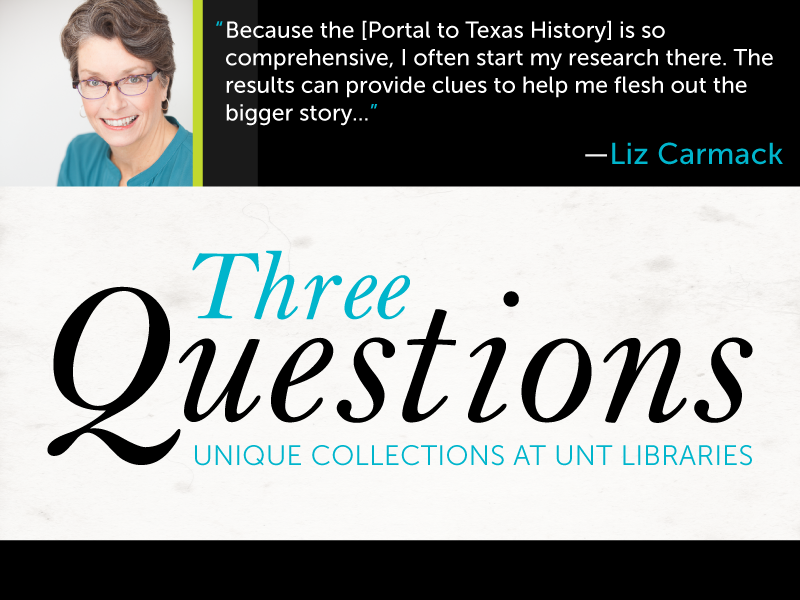
Three Questions with Liz Carmack
Liz Carmack is a writer, editor, researcher and consultant. She authored Historic Hotels of Texas: A Traveler’s Guide and Rodeo Austin: Blue Ribbons, Buckin’ Broncs and Big Dreams, both published by Texas A&M University Press. Liz serves as Senior Communications Specialist for the Texas Association of Counties in Austin. She earned her bachelor’s degree in journalism from Oklahoma State University and her master’s degree in mass communications from the University of Leicester in Leicester, England. Three Questions is an initiative to share the value that our faculty, students, and others in the UNT community derive from using the Unique Collections at UNT Libraries. How important are Unique Collections in your teaching, learning or research? During the early phase of writing my book, Rodeo Austin: Blue Ribbons, Buckin’ Broncs and Big Dreams, the portal was one of the first places I turned as I began researching the topic. Rodeo Austin, a nonprofit that raises funds for college scholarships through a livestock show, auction and rodeo, had no early records of its organization, so the portal was invaluable to my research. I was able to search broadly on the portal, looking for any evidence of early livestock shows and rodeos in Texas. What I found established the historical context for the show’s founding in 1940 and led me to further sources that helped flesh out the full story. Today, my colleagues at the Texas Association of Counties and I use the portal to hunt for historic images related to Texas and county government and use them in our publications, such as our annual report to members. I also use the portal when researching stories about county history for our bi-monthly magazine, County. How have Unique Collections changed the way you approach your research, teaching or learning? Because the portal is so comprehensive, I often start my research there. The results can provide clues to help me flesh out the bigger story, lead me to other sources of research, confirm a fact I’m double-checking, or deliver the exact piece of information or photo I’m seeking. The portal was limited in scope when I wrote my first book, Historic Hotels of Texas: A Traveler’s Guide, so I didn’t rely upon it for the project. If I were researching that topic today, the portal would probably save me hours of time and effort. What do you want others to know about your research? In my current position at the Texas Association of Counties I write a series called Historical Highlights that focuses on the history of particular counties and how county governments work to preserve it. The information I glean from the portal often ends up in those articles in County magazine. You can find them at www.county.org/magazine. Just click the Historical Highlights link. Liz Carmack is a writer, editor, researcher and consultant. She authored [Historic Hotels of Texas: A Traveler’s Guide][] and Rodeo Austin: Blue Ribbons, Buckin’ Broncs and Big Dreams, both published by Texas A&M University Press. Liz serves as Senior Communications Specialist for the Texas Association of Counties in Austin. She earned her bachelor’s degree in journalism from Oklahoma State University and her master’s degree in mass communications from the University of Leicester in Leicester, England. external_relations_in_the_news_three_questions
Posted:
12/13/2016

Paws & Relax a Big Success
Students, faculty and staff gathered in Willis Library to “paws & relax” for finals. From Maggee the black and silver schnauzer to Winston the lab mix, there was an abundance of wagging tails in Willis Library on Monday afternoon. On Monday, December 12, students gathered in Willis Library to interact with the six dogs who received pats, belly rubs, and a whole lot of love. The dogs were all accompanied by their owners, who are representatives of Paws Across Texas, a Fort Worth-based nonprofit that trains dogs and their owners to provide diversified therapy programs and comfort to those going through a stressful time. Virginia Hyatt helped found the organization 30 years ago, after she and her two co-founders saw a lack of animal therapy programs of this kind. “There weren’t any events,” Hyatt said. “They wouldn’t allow animals anywhere.” She added that Paws Across Texas now visits 20-30 facilities a month, including universities and children’s hospitals. UNT was their last visit of this year, with the goal of giving students a much-needed break from their studies and a boost of encouragement. “Finals is a stressful time, so this was designed to give students a break,” said Lilly Ramin, who is an instructional technologies librarian and USLAB advisor along with with Assistant Dean for Personnel Mary Ann Venner, who helped organize the event. ”[The event] gives a ‘paws’-itive face to the Libraries,” Ramin said. Feedback for Paws & Relax has been overwhelmingly positive over the past six semesters, and another event is anticipated for the spring. Paws & Relax is sponsored by the Undergraduate and Graduate Student Library Advisory Boards. in_the_news
Posted:
12/13/2016
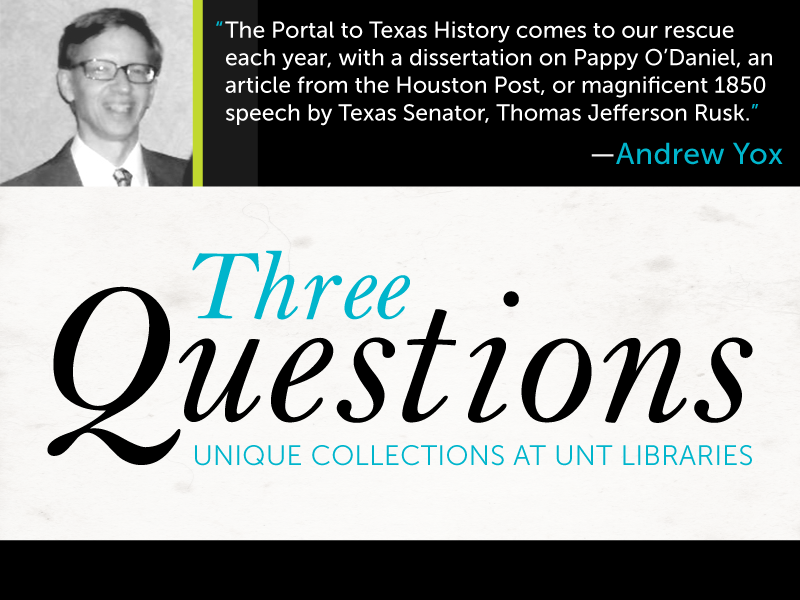
Three Questions with Andrew Yox
Dr. Andrew Yox is the Honors Director at Northeast Texas Community College. Three Questions is an initiative to share the value that our faculty, students, and others in the UNT community derive from using the Unique Collections at UNT Libraries. How important are Unique Collections in your teaching, learning or research? My 1983 University of Chicago dissertation involved day-by-day microfilm research on German-American newspapers. What a privilege it is by contrast to get on the Portal of Texas History. We have an honors program devoted to research and we do a lot of work in Texas history, both for the production of feature-length films (Query our website at NTCC Honors for Texas history films), and for essays. We at the same time lack a comprehensive research library within an hour of our campus. The Portal to Texas History comes to our rescue each year, with a dissertation on Pappy O’Daniel, an article from the Houston Post, or magnificent 1850 speech by Texas Senator, Thomas Jefferson Rusk. Now I can suggest much more unusual topics to my students, and also get them started with a few finds of the collection. Ana Krahmer of the Digital Newspaper Unit has been a great catalyst as well in bringing us to new frontiers of knowledge. How have Unique Collections changed the way you approach your research, teaching or learning? Thanks to the Unique Collections we have become much more bold about research, and much more willing to direct students to new fields of work. We have amassed seven State of Texas Caldwell Awards, a Smallwood, several awards of the Great Plains Honors Council, and several publications in Touchstone, published by the Texas State Historical Association, in recent years being able to launch out into the wonderland of primary documents provided by the Portal to Texas History. We also have presented work consistently at the National Collegiate Honors Council. Not every state has these kind of resources, so I believe scholars from our small community college now have some advantages. What do you want others to know about your research? We note that at some point in the early twentieth-century, high school athletics crossed over from a peripheral to a mainstream activity for small towns in Texas. We believe that there are many aspects of regional culture that are ignored, many questions that go un-researched, and questions to which a substantial population craves answers. Through our films and essays in Texas history we hope to supply not only a kind of regional cultural experience, but to provide our students with a chance to present, publish, and win various awards. One ultimate aftereffect of the Portal to Texas History is that our students have been averaging three-four national awards a year. Dr. Andrew Yox is the Honors Director at Northeast Texas Community College external_relations_in_the_news_three_questions
Posted:
12/07/2016
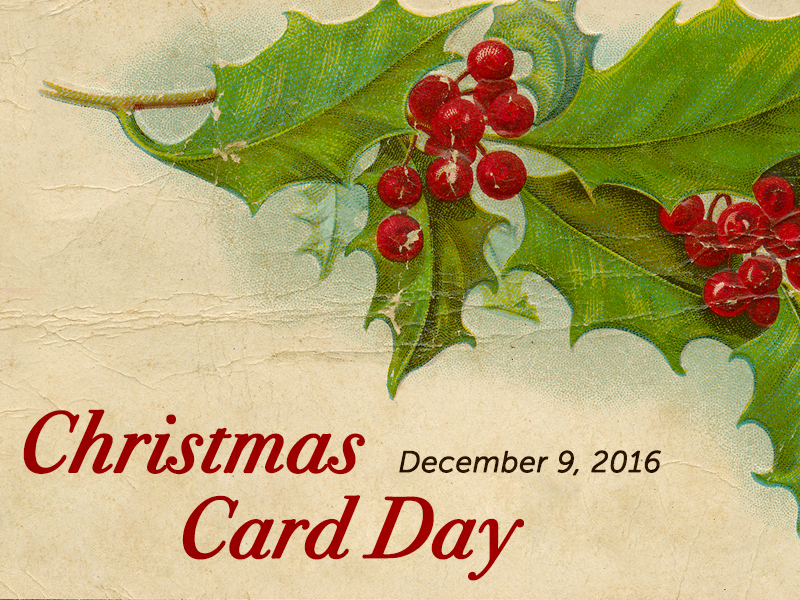
Christmas Card Day
Make sure to send out your own cards on this day and while you’re at it, check out the large selection of beautiful vintage Christmas cards from The Portal to Texas History. Finals are upon us, and with them the start of the holiday season. Friday, December 9 is the official celebration of Christmas Card Day. Before you send out your cards to all your loved ones, take a look into Christmas cards of the past by browsing through the extensive collection within The Portal to Texas History. The very first Christmas card was printed in 1843 in Victorian England, a product of the newly introduced postal system. Sir Henry Cole, a famous inventor and educator in his time, found himself overwhelmed with the amount of mail he received during the holiday season. Since leaving letters unanswered in Victorian England was considered impolite, Cole needed a way to respond to all of his well-wishers. With the help of his friend, artist J.C. Horsley, he created an image of a family gathered around a table and had it printed on cardboard, with a “To:” and “From:” label at the top of each card to make filling it out quick and efficient. This led to the creation of the first method of sending just the right amount of holiday cheer that has carried on into our culture today. in_the_news
Posted:
11/18/2016
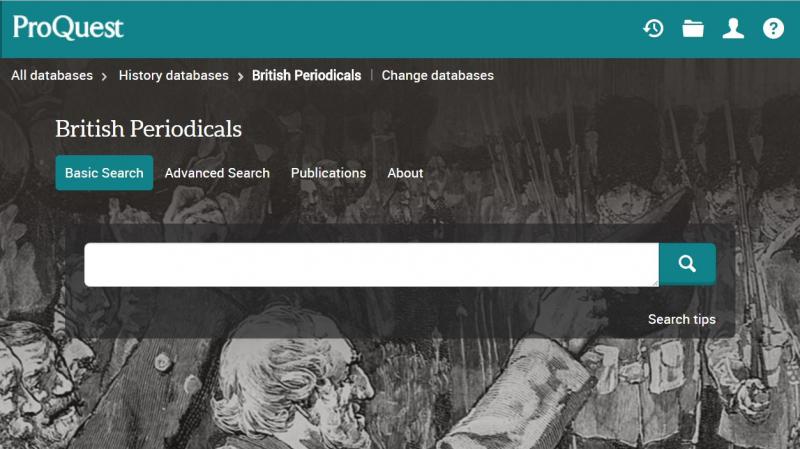
New Resource! British Periodicals 2 and 3
British Periodicals Online provides access to the searchable, full text of hundreds of periodicals from the late seventeenth century to the early twentieth, comprising millions of high-resolution facsimile page images. Topics covered include literature, philosophy, history, science, the social sciences, music, art, drama, archeology and architecture. In addition to our British Periodicals 1 collection from ProQuest, British Periodicals 2 & 3 are now available. This resource offers page images and searchable full text for nearly 500 British periodicals published from the seventeenth century through to the twentieth century. Search now across all three collections at once. British Periodicals Collection I consists of more than 160 journals that comprise the ProQuest microfilm collection Early British Periodicals. Topics covered include literature, philosophy, history, science, the fine arts, and the social sciences. British Periodicals Collection II consists of more than 300 journals from the ProQuest microfilm collections English Literary Periodicals and British Periodicals in the Creative Arts together with additional titles, amounting to almost 3 million pages. Topics covered include literature, music, art, drama, archeology, and architecture. British Periodicals Collection III focuses on the first half of the twentieth century. It contains popular periodicals of the period and were highly influential in their mix of news/politics, miscellany, art, photography, literature and comedy/satire, while launching the careers of many leading artists/illustrators of the age. All of this material is available in page image format with fully searchable text. Users can filter results by article type and download articles as either PDFs or JPEG page images. Each facsimile page from Collections I-II is available in high-resolution gray scale, providing scholars with an authentic and nuanced record of the printed source. Collection III introduces full color images where color was present in the original print volume. collection_development_eresources
Posted:
11/15/2016
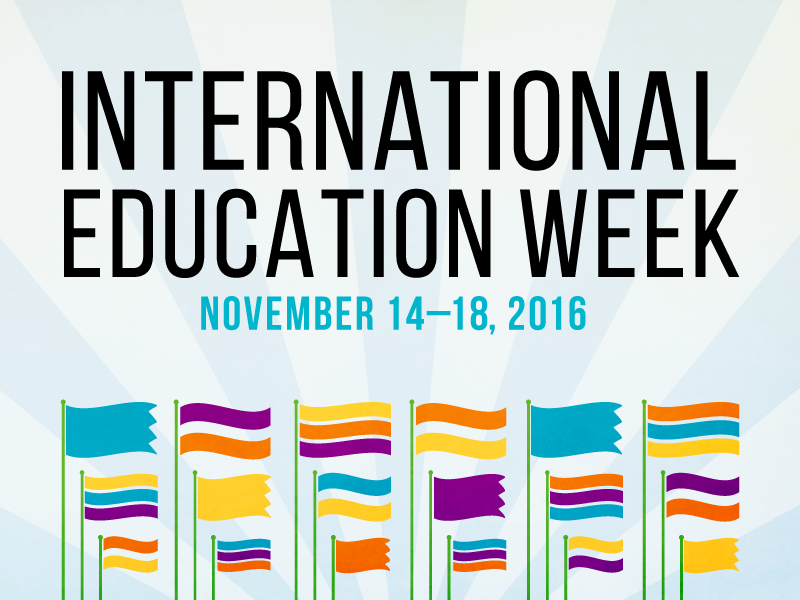
International Education Week comes to UNT Libraries
International Education Week is a global effort to engage individuals, institutions, and communities to strive for increased cooperation through education. Learn how you can get involved with UNT Libraries! Every year during the second week in November, the United States celebrates International Education Week. Hosted as a joint effort between the U.S. Department of State and the U.S. Department of Education, this event aims to “celebrate the benefits of international education and exchange worldwide.” This year it will run from November 14 to November 18. Participation in International Education Week revolves around advancing international education and awareness. UNT Libraries have a ton of resources available to help you expand your knowledge and open your mind to a growing global world through the study of international education and literature]. You can get involved with IEW on social media or the events connected with UNT. A calendar of UNT events is posted on the UNT International website. International Education Part of International Education Week includes participation in exchange programs that promote international education. The UNT Libraries has resources that relate to six different areas of international education: Comparative librarianship Cross-cultural orientation Intellectual cooperation International baccalaureate Internationalism Student exchange programs Literature Literature is one of the most important facets of education, as it has the ability to expose us to different ways of thinking and help us empathize with those whom we wouldn’t be able to otherwise. Much like Elie Wiesel’s Night trilogy, a memoir detailing his experiences in a Nazi concentration camps, taught us about one of humanity’s darkest moments, so can literature bring to life our shared experiences, fostering empathy and breeding compassion. Other popular classics from around the world are available at UNT Libraries, some in print or e-book. Examples include, but are not limited to, Nobel Prize in Literature Winners Gabriel García Márquez One Hundred Years of Solitude (Columbia) The Stranger by Albert Camus (France), View with a grain of sand: selected poems of Wislawa Szymborka (Poland) and many more. The UNT Libraries contain multiple resources about literature as it relates to globalization and society. Some selected resources can be found on the Willis Library Book Drop to give you an idea of authors: The Routledge Companion to World Literature The Norton Anthology of World Literature World Literature, world Culture You can also browse our Willis 1FL Graphic Novels and current reading in our McNaughton lease books (bookshelf next to room 136). Social Media To really get in the spirit of International Education Week and spread the word, consider getting involved in the world of social media. Like UNT International on Facebook RSVP to UNT International Education Week to stay updated. in_the_news
Posted:
10/31/2016
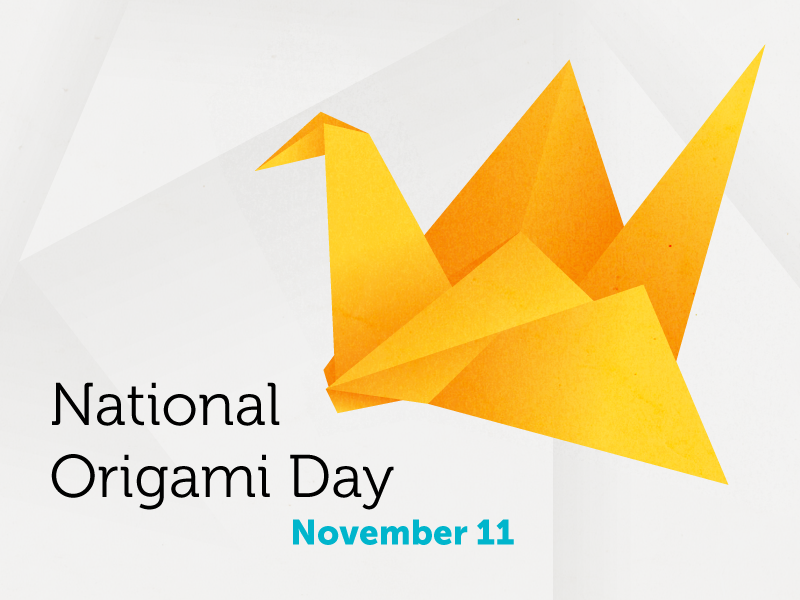
Celebrate Origami Day with UNT Libraries
Let UNT Libraries bring you into the fold and learn all about origami! Check out our resources from the Library Catalog and learn all about the ancient art of origami. Although the story of how it began is debated, the popularity of origami through the centuries is undeniable. Originally believed to have grown in China after the invention of paper, origami spread to Japan, where it became a component of Shinto wedding ceremonies. The word “origami” comes from the combination of the Japanese words “ori” meaning “to fold”, and “kami” which means “paper.” In Japan, the crane - or orizuru - is one of the most popular origami creations. It is a symbol of peace, and has also been used to represent healing and an end to suffering. A monument in Hiroshima that memorializes the children lost during the dropping of the atom bomb at the end of WWII is topped by a statue of a young girl holding an origami crane preparing to fly into the air. The girl, Sadako Sasaki, suffered from leukemia and would fold paper cranes in the hospital in hopes of getting better. In the years since she succumbed to the illness, people leave thousands of paper cranes on the statue, and her story has been synonymous with the pursuit of peace across Japan and around the world. in_the_news
Posted:
10/26/2016
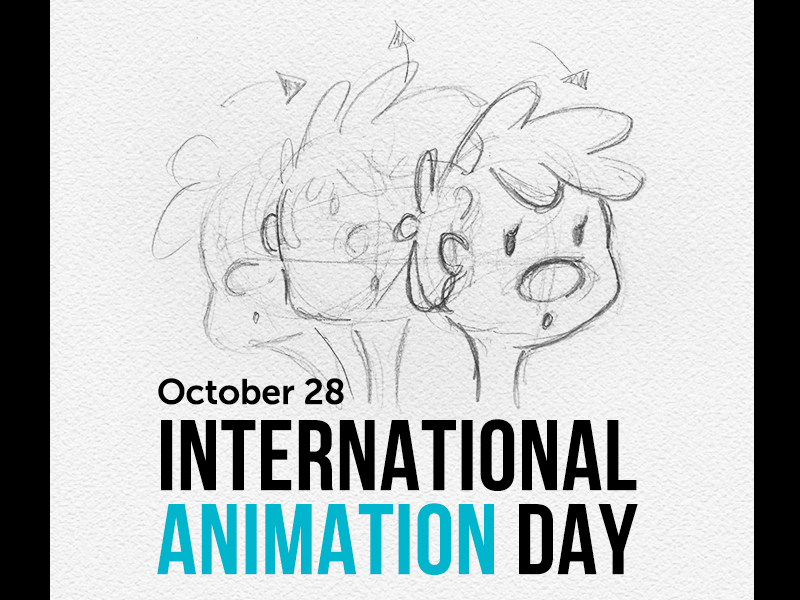
Celebrate International Animation Day with UNT Libraries
In 1892, Charles-Emile Renaud’s Theatre Optique became the first ever moving picture show, starting a new style of art that still captivates audiences today: animation. Technology has grown in leaps and bounds since Theatre Optique debuted, and animation along with it. There are several ways you can celebrate the art of animation with UNT Libraries: Attend a workshop and learn how to use Blender animation software with The Factory. Read a book about the history of animation from the UNT Library Catalog. Check out online resources to help you become a better animator. Watch one of the many animated movies available for checkout at the Media Library. in_the_news
Posted:
10/24/2016
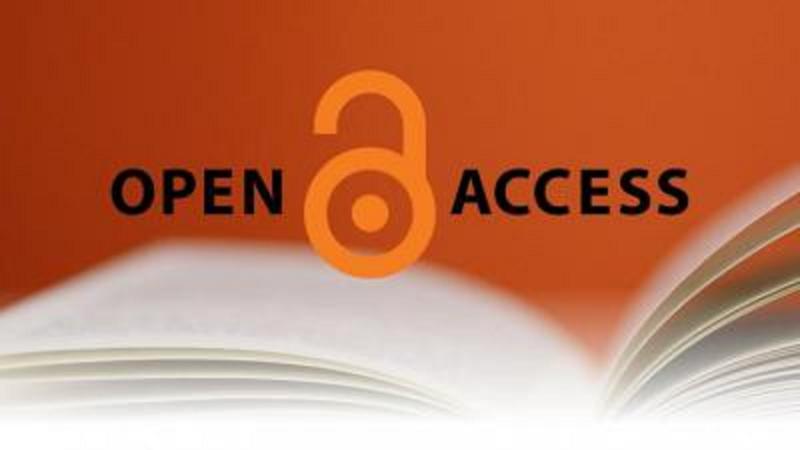
Open Access Week 2016: What's Brewing at UNT?
UNT Faculty are invited to come sip delicious craft brews as you learn how Open Educational Resources can create a classroom and lower costs for students. UNT Libraries has partnered with CLEAR to showcase Open Educational Resources that can be used to create a more collaborative classroom. These resources will highlight alternatives to high-priced textbooks, and other open resources for faculty to use in the classroom. At this event, you’ll also have the opportunity to taste Denton County Brewing Company’s brand new fall beer, along with other delicious beers and wines. Event Information: Monday, October 24, 2016 at 5-7pm, Willis Library, Room 140. research_support_services_in_the_news
Posted:
10/17/2016
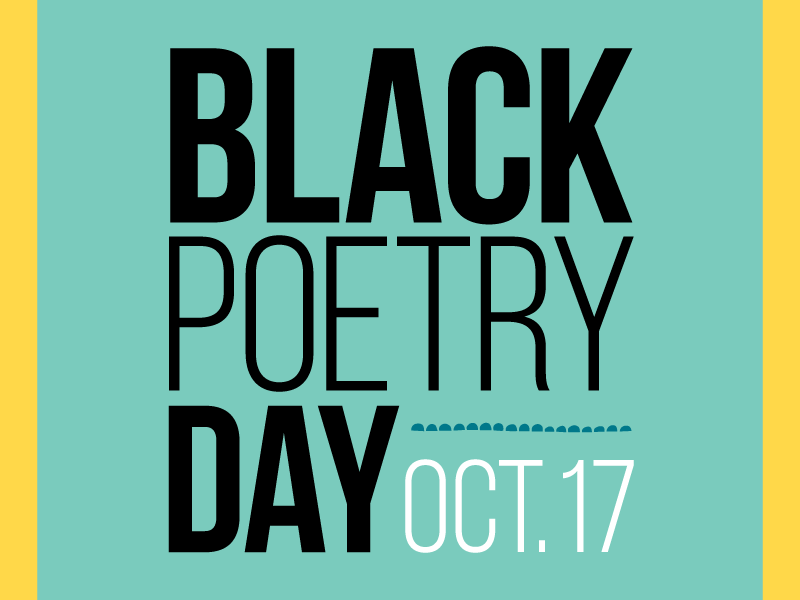
Celebrate Black Poetry Day with UNT Libraries
On October 17, 1711, Jupiter Hammon was born in Long Island, New York to a slave family on the Lloyd Estate in Queens’s Village. Unlike many other slaves of his time, Hammon was allowed to go to school and learn to read and write. He would later become the first African-American poet to be published in the United States with his first published work, “An Evening Thought. Salvation by Christ with Penitential Crienes: Composed by Jupiter Hammon, a Negro belonging to Mr. Lloyd of Queen’s Village, on Long Island, the 25th of December, 1760.” Hammon lived through four generations of the Lloyd family and remained a devout Christian until his death circa 1806. Because of his influence on the literary world, Hammon’s birthday is the official celebration of Black poetry in the nation. On this day, we honor Hammon, the first official published Black female poet Phillis Wheatley, and all the others who contributed to the advancement of Black poetry and expression in the United States. You can find the poetry and biographies of notable Black poets and authors such as Langston Hughes, Maya Angelou, Gwendolyn Brooks, Rita Dove, Arna Bontemps, and many others in the UNT Library Catalog. resource_highlight
Posted:
10/13/2016
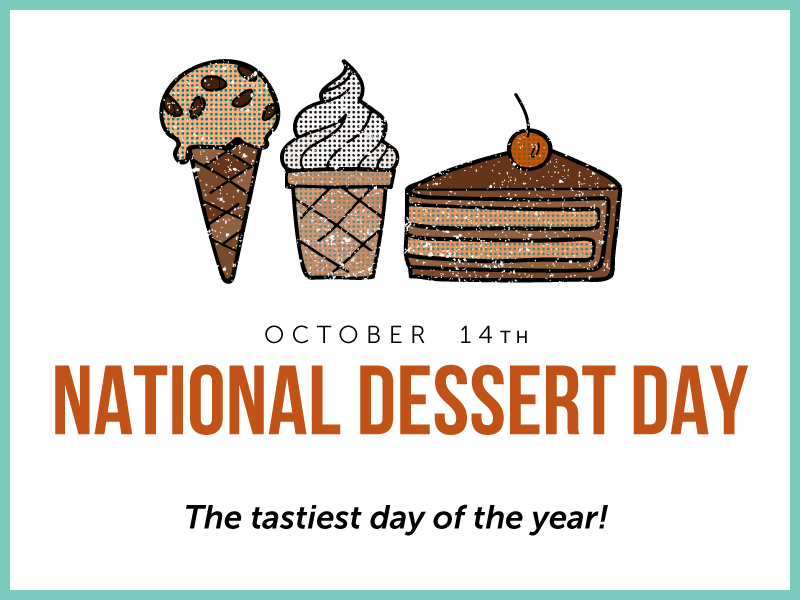
October 14 is National Dessert Day
October 14 marks National Dessert Day, a day in which those with a sweet tooth can indulge in their favorite treats. The best way to celebrate this delightful day is to go and buy your favorite dessert - or better yet, make your own with the help of UNT Libraries. You can learn how to bake and make your favorites by checking out a book from the Library Catalog or streaming an instructional video from the Media Library. Whether it’s cake, cookies, ice cream, donuts, or anything else loaded with sugar and happiness, treat yourself to something sweet today! did_you_know
Posted:
10/13/2016
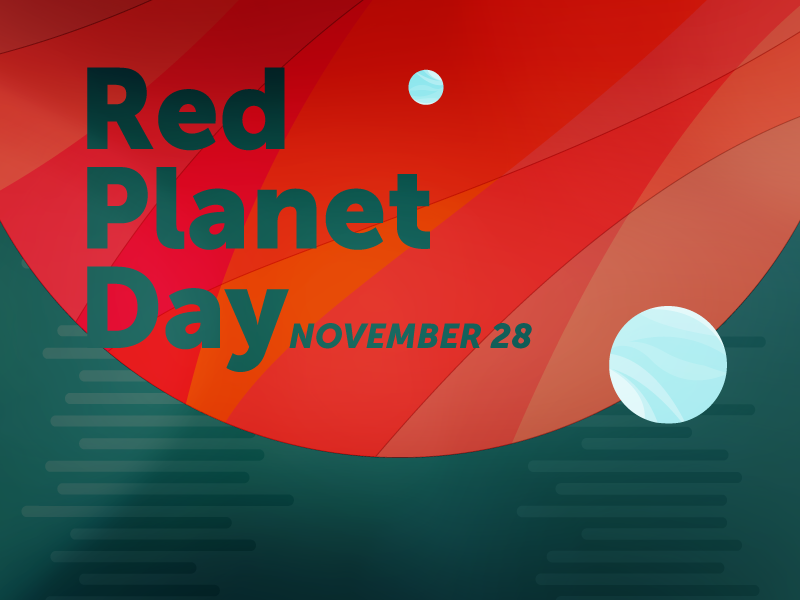
Happy Red Planet Day!
Learn all about Earth’s closest planetary neighbor this Red Planet Day with UNT Libraries! November 28 is Red Planet Day! Learn all about Earth’s closest planetary neighbor with UNT Libraries: Check out a book about Mars. Watch a documentary from the Media Library. On November 28, 1964, the Spacecraft Mariner 4 launched toward the Red Planet, sending back the first ever images of the Martian terrain a few months after landing. This feat was instrumental in human knowledge of our own solar system, and can be considered a predecessor to all the work being done to send a human to Mars in the coming decades. To see what the rovers currently on Mars are up to and stay up to date with Mars news, check out NASA’s Mars portal. You can also check out the work SpaceX is doing to send human beings to the Red Planet within our lifetime. in_the_news
Posted:
10/05/2016
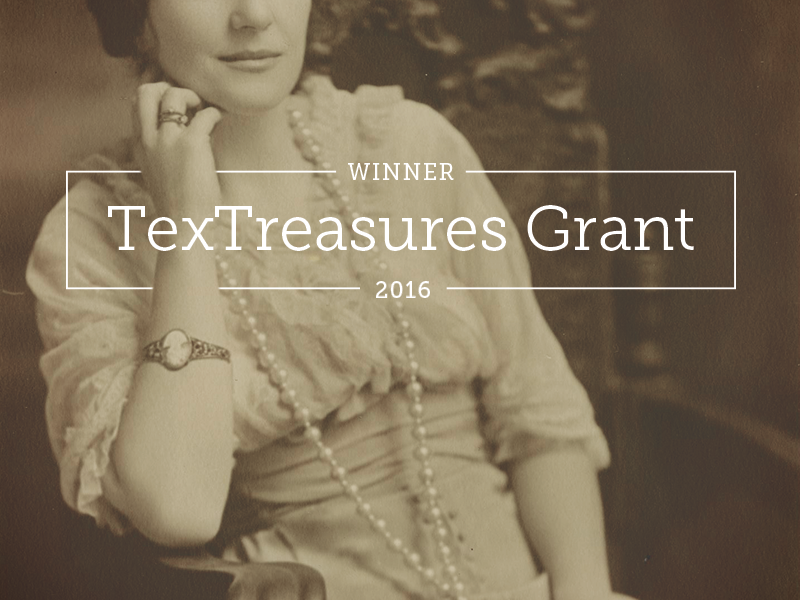
UNT Libraries' Digital Newspaper Unit Receives a TexTreasures Grant
The UNT Libraries’ Digital Newspaper Unit has another very exciting announcement about a new grant award to add more titles to the Texas Digital Newspaper Program. The “Texas Borderland Newspaper Digitization Project” is funded through a September 2016-August 2017 grant from the Institute of Museum and Library Services (IMLS) and the Texas State Library and Archives Commission (TSLAC), as part of TSLAC’s TexTreasures competitive grants program. Through this $25,000 award, the Newspaper Unit will digitize newspapers from eighteen counties near the Texas border, comprising at least 23,000 pages and beginning in 1887. To learn more, please see the full article UNT Libraries’ Digital Newspaper Unit Receives A 2016-2017 TexTreasures Grant on The Portal to Texas History. digital_newspaper_unit_honors_and_awards
Posted:
09/12/2016
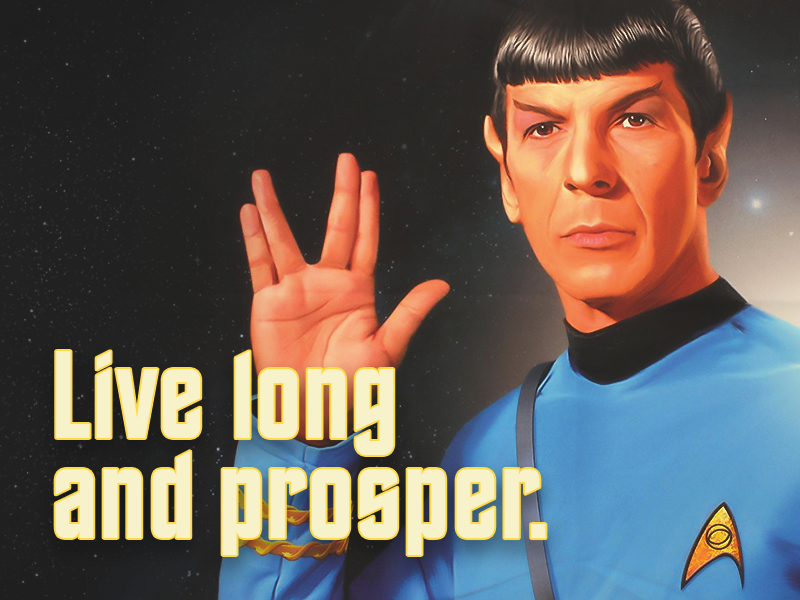
UNT Libraries: The Final Frontier
The beloved sci-fi classic Star Trek has indeed lived long and prospered. September 8, 2016 marked fifty years since the first episode was broadcast on NBC. Trekkies around the world are celebrating the occasion, all the way from the International Space Station to all the people on Twitter posing their well-wishes to the [#StarTrek50][] hashtag. You too can celebrate Star Trek’s 50th Anniversary with the Trekkies here at the UNT Libraries. Explore the nearly 550 Star Trek-related items in the Library Catalog. Relive the series, the movies, and related films with the Media Library. Check out all the scholarly books that analyze Star Trek and its influence on our culture. Listen to the Music Library’s vast collection of music from and inspired by the franchise. Travel at warp speed into the past and check out the Digital Collections’ Star Trek photos, memorabilia, newspaper articles, and more! in_the_news_resource_highlight
Posted:
09/08/2016
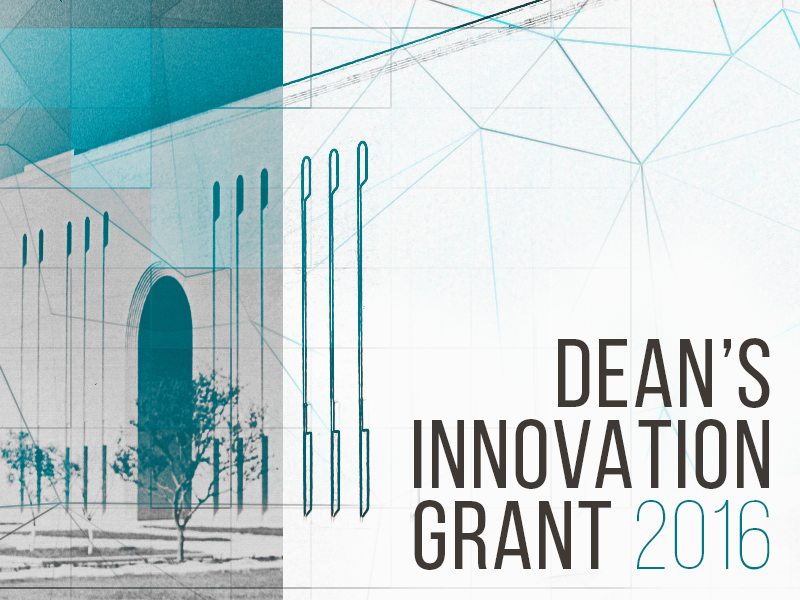
Dean's Innovation Grant 2016: What's Brewing at UNT?
Academia meets happy hour in this effort to engage faculty with library resources and services with a backdrop of beer and hors d’oeuvres. The goal of this project was to promote faculty engagement with library resources on a local and global level through the use of two showcase-style events, one per long semester. The University of North Texas Libraries’ Dean’s Innovation Grant, formerly known as the Green Light To Greatness Award, provides funding to research and projects within the UNT Libraries that promote scholarship and contribute to the gathering of knowledge that helps improve our libraries, our university, and the community. Dean’s Innovation Grant 2016 Awardees Pamela Andrews, Greg Hardin, Susan Smith Project Title What’s Brewing at UNT? Project Description Academia meets happy hour in this effort to engage faculty with library resources and services with a backdrop of beer and hors d’oeuvres. The goal of this project was to promote faculty engagement with library resources on a local and global level through the use of two showcase-style events, one per long semester. It was inspired by a similar project conducted at the University of Dayton, which created a “low-key, happy hour showcase for faculty and library employees to mingle and discuss library initiatives.” Beer-tasting stations and a bigger emphasis on non-print material are meant to encourage faculty to interact with the material and each other, informing them about the Libraries’ services and resources in a fun and relaxing environment. Contributor Biographies Pamela Andrews is a Repository Librarian in the Digital Curation Unit. She has a Master of Science in Library and Information Science from Florida State University and a Master of Arts from the University of Central Florida. Greg Hardin is the Information Literacy Coordinator in Library Learning Service. He has a Master of Library Science in Library and Information Studies from TWU. Susan Smith, Ph.D. is the Head of Library and Research Support Services. She has a Ph.D. in Public and Urban Administration from the University of Texas at Arlington and a Master of Library Science in Library and Information Studies from the University of Oklahoma administrative_office_in_the_news_honors_and_awards
Posted:
09/07/2016
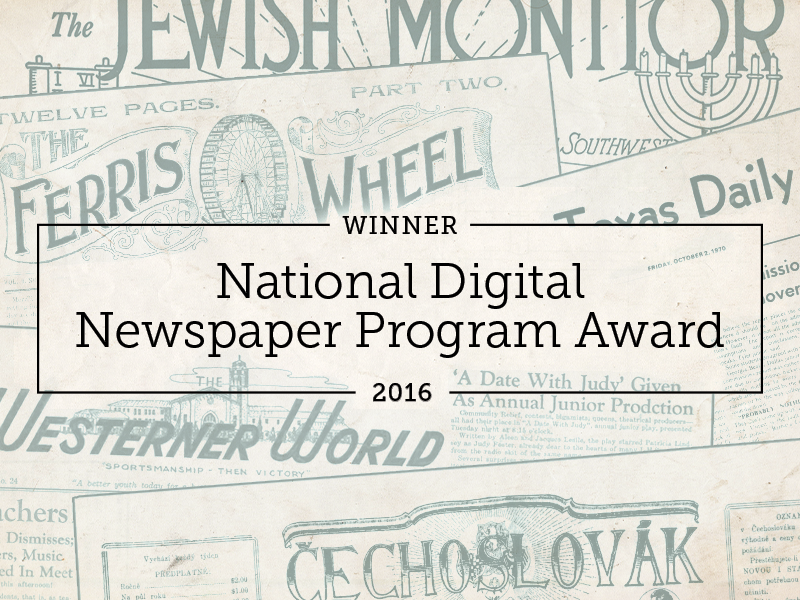
UNT Libraries Receives Another NEH Newspaper Award
UNT Libraries are pleased to announce that the National Endowment for the Humanities and Library of Congress have selected us for a fourth, two-year cycle of the National Digital Newspaper Program (NDNP), to digitize Texas newspapers on the Library of Congress’ Chronicling America. This award is for $200,000 and will build access to an additional 100,000 pages of Texas newspapers on Chronicling America, to spotlight community identity in Texas. This time, the news is even more exciting because these additional newspapers will be in Spanish and German. Access to these additional issues and languages in a national context will represent and support the large populations in Texas whose ancestors settled here in the 19th-century and documented their experiences in these very newspapers. In addition to adding the newspapers to Chronicling America, where Texas identity can be preserved alongside other state awardees’ newspapers, we will include these newspapers in the Texas Digital Newspaper Program (TDNP). To learn more, please see the full article The National Endowment for the Humanities has Selected UNT Libraries for Another Round of the National Digital Newspaper Program on The Portal to Texas History website. digital_newspaper_unit_honors_and_awards
Posted:
09/02/2016
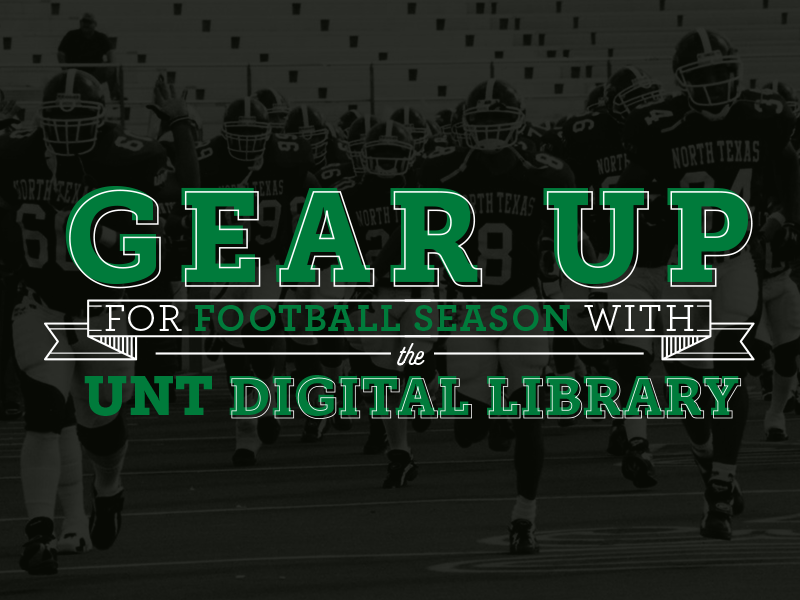
Gear Up for Football Season with the UNT Digital Library
A hopeful football season is just around the corner, and UNT is buzzing with anticipation. As you prepare to cheer on the Mean Green, take a look at the UNT Digital Library’s collection of videos of football games past. This collection contains news clips and coaches’ films from as far back as the 1970s. Watch the plays and touchdowns of football teams past, and relive a piece of UNT history before diving into the 2016 season. Among the 71 videos included are news clips of stories that reflect other pieces of North Texas history, including stories about Fort Worth football coaches as well as the Dallas Cowboy football players and cheerleaders. collection_highlight
Posted:
08/31/2016
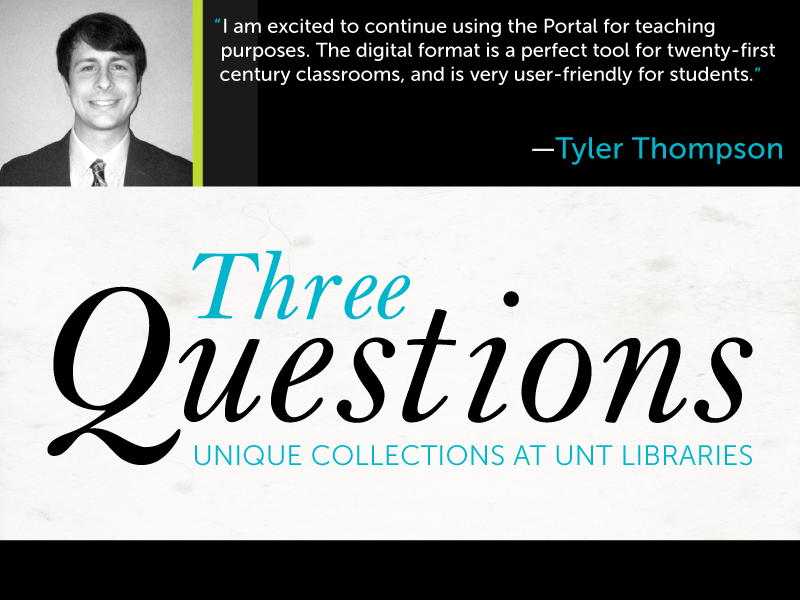
Three Questions with Tyler Thompson
Tyler Thompson is a doctoral candidate in the Department of History at Texas A&M University. He received his bachelors and masters in history from UT-San Antonio. Tyler’s dissertation examines how racial and gendered rhetoric underscored conquest across Texas which was justified in subsequent myths and memories of the history of the state. He was born in Austin, Texas and plans to teach and research for a university when he graduates. Three Questions is an initiative to share the value that our faculty, students, and others in the UNT community derive from using the Unique Collections at UNT Libraries. How important are Unique Collections in your teaching, learning or research? The UNT Portal to Texas History has been a crucial aspect of research throughout my academic career. I am incredibly grateful for its wealth of resources including historical newspapers, almanacs, and photographs. The website is simple to navigate and easily accessible for researchers. As an undergraduate student, I utilized the Portal for my senior seminar paper on Native American representations in Texas, and subsequently used this paper as a writing sample for graduate school applications. In graduate school, I turned to the UNT Portal again for a research seminar, and I was lucky enough to have that essay published as a peer-reviewed journal article in the Journal of South Texas. I am currently using the UNT Portal to strengthen my dissertation, “Representations of American Indians in Texas Memory and Mythology, 1875-1936.” The Portal resources have helped develop my primary source base and have contributed to my analysis of how Texans collectively memorialized and represented Native Americans as a justification for conquest throughout the Texas Panhandle. As a teaching assistant, I assisted in a class project in which the students in a Texas History course drew from the UNT Portal to research and write an essay on an aspect of local Texas History that they found interesting. Many students chose their hometowns, and wrote on diverse topics such as baseball, railroads, Klan violence, bank robberies, and natural disasters. It was enlightening to read their eclectic responses. I witnessed the students develop analytical skills as researchers and gain a deeper understanding of the past through the assignment. I plan to implement a similar strategy in my own classroom as an educator. How have Unique Collections changed the way you approach your research, teaching or learning? The UNT Portal has strengthened my primary source base for my dissertation research. The helpful search filters and the substantial amount of material have reinforced my argument as well. The Portal has become a starting place for me when I broach a new angle in my writing and research. One of the first things I now consider is how Texas newspapers represented and discussed specific topics. I am excited to continue using the Portal for teaching purposes. The digital format is a perfect tool for twenty-first century classrooms, and is very user-friendly for students. I think the Portal material is suitable for independent essay assignments as well as collaborative group projects in which students work together to build a presentation for the class. The Portal encourages creativity, teamwork, and builds useful skills that students will use beyond their course in history, politics, et cetera. What do you want others to know about your research? Representations and memories of Native people continued long after their violent removal from Texas. I have found that these representations often centered on representing the indigenous population in ways that justified the conquest of the region. Significantly, these representations changed over time, and Anglo Texans used sites of memory to perpetuate a narrative that placed their actions in a favorable light. I think it is also important to highlight the fact that Native people responded in creative ways to these representations. For instance, I found several newspaper articles in the Portal that referred Kiowa men making speeches after a 1916 Wild West Show. They used this platform to influence Anglo Texans, and participate in the ways individuals collectively remembered historical events. Tyler Thompson is a doctoral candidate in the Department of History at Texas A&M University. He received his bachelors and masters in history from UT-San Antonio. Tyler’s dissertation examines how racial and gendered rhetoric underscored conquest across Texas which was justified in subsequent myths and memories of the history of the state. He was born in Austin, Texas and plans to teach and research for a university when he graduates. external_relations_in_the_news_three_questions
Posted:
08/16/2016
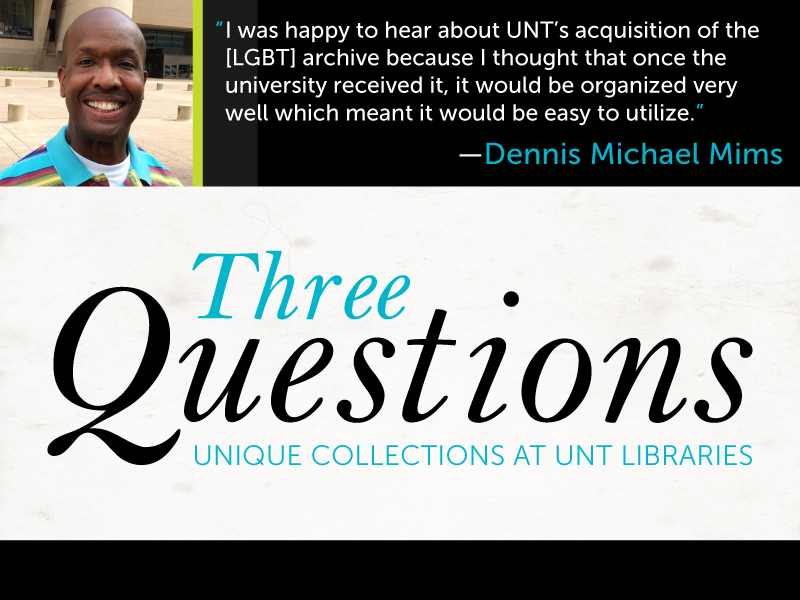
Three Questions with Dennis Michael Mims
Dennis Michael Mims is a doctoral candidate at University of Texas at Dallas. He received his B.A. in Historical Studies from UT Dallas and his M.S. in History from University of North Texas. After completing his Ph.D., he plans on having a career in academia. Dennis Michael plans on teaching and researching and writing about civil rights and social movements. He is a native Texan who comes from a close-knit family that lives here in the DFW Metroplex. Three Questions is an initiative to share the value that our faculty, students, and others in the UNT community derive from using the Unique Collections at UNT Libraries. How important are Unique Collections in your teaching, learning or research? The lesbian, gay, bisexual and transgender (LGBT) archive in Special Collections at the University of North Texas (UNT) and the Portal to Texas History are highly important to my dissertation research. My dissertation is a history of Dallas’ LGBT community. It spans four decades. The current title of my dissertation is A Queer History of Dallas: The Formation, Development, and Integration of Big D’s LGBT Community, 1965-2005. The large LGBT archive is important to my research because it contains a wide array of primary source materials. The Portal to Texas History is important because it also contains some primary source materials, photographs, and the Dallas Voice, the three-decade old newspaper that covers Dallas’ LGBT community. I knew about the LGBT archive when it was located at the Resource Center in Oaklawn. Even though I had checked out some books from the Resource Center’s library, I had never gone through its archive. Shortly after I started in the doctoral program at the University of Texas at Dallas (UTD), the LGBT archive was donated to UNT. I was happy to hear about UNT’s acquisition of the archive because I thought that once the university received it, it would be organized very well which meant it would be easy to utilize. I was correct in my thinking about how Special Collections would organize the archive. How have Unique Collections changed the way you approach your research, teaching or learning? The amount of source material in Unique Collections has influenced my approach to my project. For example, the LGBT archive in Special Collections at UNT is a large one that contains several subsections. Because of the size of the archive, I have had to think closely about what I want to put in the history that I am writing and what will be left out of it. Even though this is a challenge for me, it is not bad at all. I think that it is safe to say that most historians prefer the problem of having too much source material to work with than too little. Special Collections and the Portal to Texas History have also made me think about the illustrations that will be employed in my dissertation. I knew that I would use a certain amount of photos in my project, however, after I started going through Special Collections and the Portal to Texas History, I began to think more closely about the pictures that will be used in the history that I am writing. Regarding illustrations, I have the same challenge that I have with documents in Special Collections. I have to decide which ones will be part of my dissertation, and the ones that will not. What do you want others to know about your research? There are a few things that I would like for others to know about my research and learning. First, I want to share that I have been married to this topic for a decade. I wrote my first seminar paper on the Cathedral of Hope in the spring of 2006. That was followed by a seminar paper on Penal Code Section 21.06 and the Baker v. Wade case in the fall of 2006. I completed my master’s thesis about Cathedral of Hope in 2009. While doing these projects, I conducted a number of oral histories related to the history of Dallas’ LGBT community. I share all of this to explain that because I have been connected to this project for so long, I had an idea of what to look for when I began my research; I also had a general idea of what kind of history I wanted to write. Second, even though I had an idea of the kind of history that I wanted to produce, some of the information that I found in Special Collections and on the Portal to Texas History caused me to rethink the approach that I was taking on my dissertation because of the new things that I have been learning. Third, I think that anyone who undertakes a major research project should be open to the possibility of producing a different kind of history than he or she had originally imagined. Dennis Michael Mims is a doctoral candidate at University of Texas at Dallas. He received his B.A. in Historical Studies from UT Dallas and his M.S. in History from University of North Texas. After completing his Ph.D., he plans on having a career in academia. Dennis Michael plans on teaching and researching and writing about civil rights and social movements. He is a native Texan who comes from a close-knit family that lives here in the DFW Metroplex. external_relations_in_the_news_three_questions
Posted:
08/08/2016
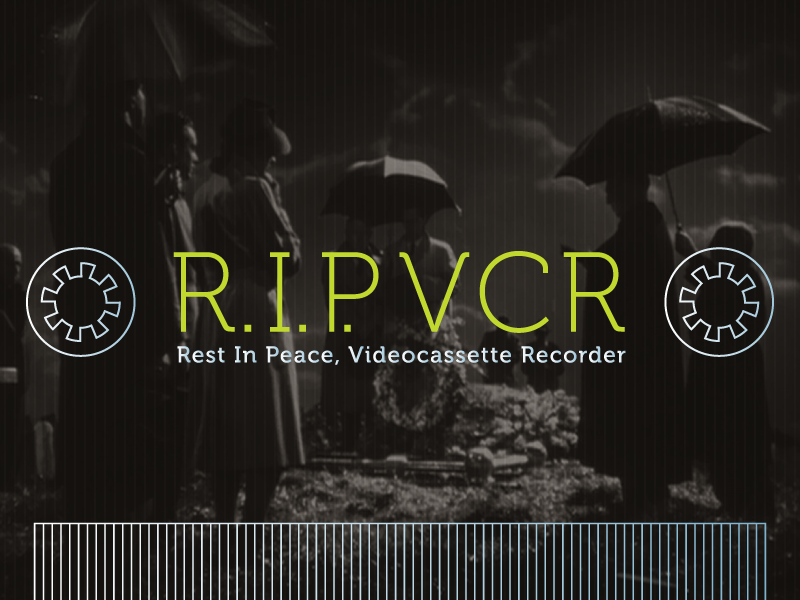
We Hardly Knew Ye: Celebrating the VCR with UNT Media Library
Everyone is obsessed with Pokemon, a Clinton is running for president against a controversial businessman, and Blink-182 is at the height of their American tour. It might be 2016, but the 90’s seem to be repeating themselves. There’s one thing, however, that won’t be coming back: the VCR. Everyone is obsessed with Pokemon, a Clinton is running for president against a controversial businessman, and Blink-182 is at the height of their American tour. It might be 2016, but the 90s seem to be repeating themselves. There’s one thing, however, that won’t be coming back: the videocassette recorder, or VCR. The VCR might be dead, but even though production stopped, the ability to explore the medium has not. Come by the UNT Media Library and you can: Check out a VCR to use at home Explore a wide selection of VHS tapes The last VCR unit was produced on July 21, 2016 by Funai Electric, marking the end of an era in entertainment technology that began in the late 1960s. The first American films to be released in this format were The Sound of Music, Patton, and [M*A*S*H][], originally costing as much as $70 a piece. The dawn of the DVD, however, marked the beginning of the end for the VCR. Although Funai Electric sold nearly 15 million units in the VCR’s heyday, sales dwindled to 750,000 by 2015 and officially stopped this year. But even though it won’t be hitting the shelves again, the VCR will always have a special place in entertainment history. collection_highlight
Posted:
08/08/2016
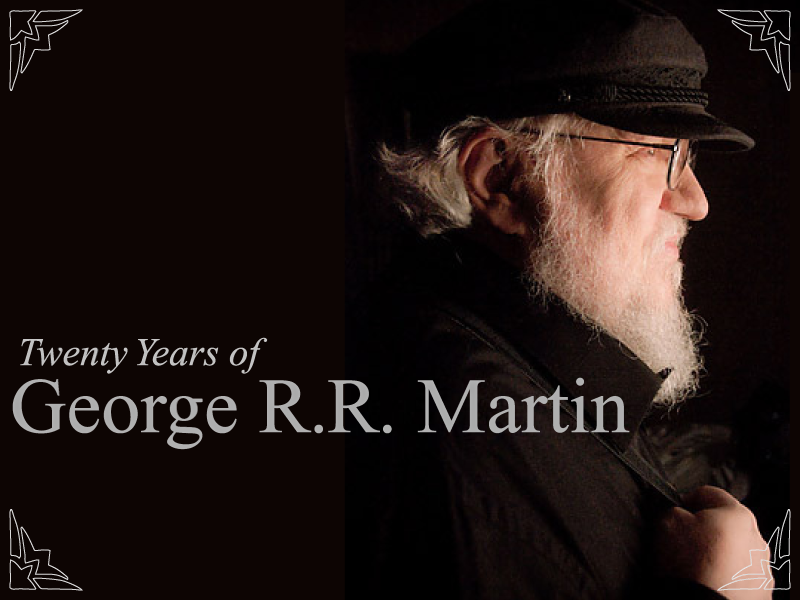
Celebrate 20 Years of George R.R. Martin
Nearly 20 years ago, author George R.R. Martin wrote A Game of Thrones and brought to life a fantasy series that would take the world by storm. You can explore the world he created by checking out UNT Libraries’ assortment of his work. Whether you’re a fan of the books and TV show or if you’re just starting to explore the world George R.R. Martin created, UNT Libraries have got you covered. Check out A Song of Ice and Fire and its companion novels. Look into the philosophy and history that inspired the series. Check out a DVD from the hit show Game of Thrones. On August 6, 1996, George R.R. Martin released a fantasy novel that was only moderately successful. For his book tour, he stopped in Denton to promote his latest creation. The book in question was titled A Game of Thrones and was originally meant to be the first book in his trilogy A Song of Ice and Fire. In a podcast interview with Geek’s Guide to the Galaxy, Martin recalled how on the Texas leg of his Game of Thrones book tour he stopped at a book store in Dallas, where to his surprise he had been scheduled to sign books at the same time as Clifford the Big Red Dog. “I had like three people, and Clifford had like three hundred,” Martin said. Now, 20 years later, this same book has topped bestseller lists and turned a modest trilogy into a seven-part epic fantasy saga that was adapted into the popular HBO show Game of Thrones in 2011, as well as a growing repertoire of various games, merchandise, and a videogame. To learn more about George R.R. Martin, check out the official repository of all his work. collection_highlight
Posted:
08/05/2016
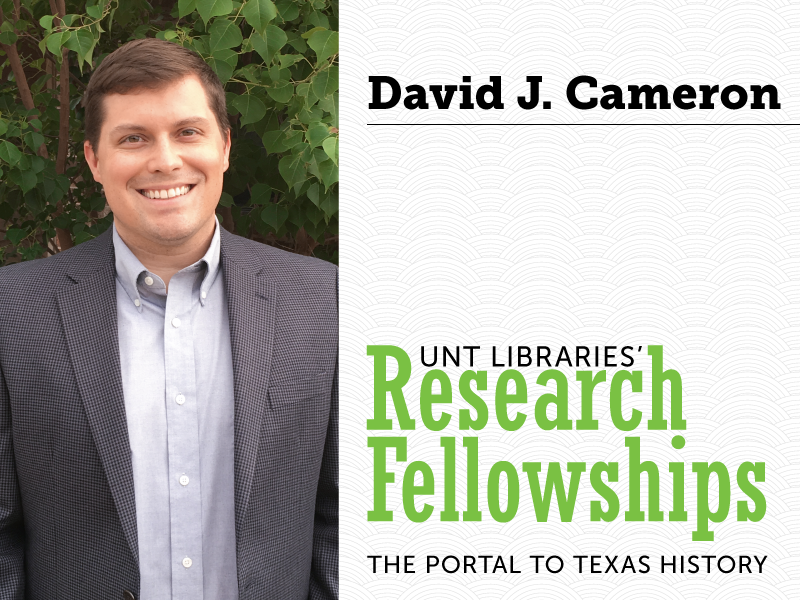
The Portal to Texas History 2016 Research Fellowship Awardee - David J. Cameron
David J. Cameron is a doctoral candidate in Chicano/Latino and Twentieth-Century United States History at Texas A&M University His project Race and Religion in the Bayou City: Latino/a, African American, and Anglo Baptists in Houston’s Long Civil Rights Movement examines how the intersections of race and religion in the Bayou City shaped Houston-area Baptists’ participation in the struggle for civil rights through religious associations, churches, and leaders. The University of North Texas Libraries invite applications for the 2016 The Portal to Texas History Research Fellowship. Research using the Portal is relevant to studies in a variety of disciplines including history, journalism, political science, geography, and American studies. We encourage applicants to think creatively about the opportunities that research with large digital library collections can enable. Preference will be given to applicants who demonstrate the greatest potential for publication and the best use of The Portal to Texas History. The Portal to Texas History 2016 Research Fellowship Awardee David J. Cameron Project Title Race and Religion in the Bayou City: Latino/a, African American, and Anglo Baptists in Houston’s Long Civil Rights Movement Project Description In his dissertation, “Race and Religion in the Bayou City: Latino/a, African American, and Anglo Baptists in Houston’s Long Civil Rights Movement,” David J. Cameron examines how the intersections of race and religion in the Bayou City shaped Houston-area Baptists’ participation in the struggle for civil rights through religious associations, churches, and leaders. This examination reveals how African American and Mexican American Baptists have resisted and challenged racial inequality in the twentieth century, as well as how those in power have at times used religion to uphold and protect white privilege and inequality. Biography David J. Cameron is a doctoral candidate in Chicano/Latino and Twentieth-Century United States History at Texas A&M University in College Station. He is currently writing his dissertation, “Race and Religion in the Bayou City: Latino/a, African American, and Anglo Baptists in Houston’s Long Civil Rights Movement,” which he will defend in the spring of 2017. His research on the intersections of race and religion in Chicano/Latino, African American, Southwestern, Texas, and Southern history has appeared in The Southwestern Historical Quarterly and Baptist History and Heritage. He has presented on these themes at the annual meetings of the Western History Association and the Texas State Historical Association, as well as the Third Bi-Annual Sal Castro Memorial Conference on Chicano Movement Historiography at UC-Santa Barbara. digital_libraries_in_the_news_research_fellowships
Posted:
07/19/2016
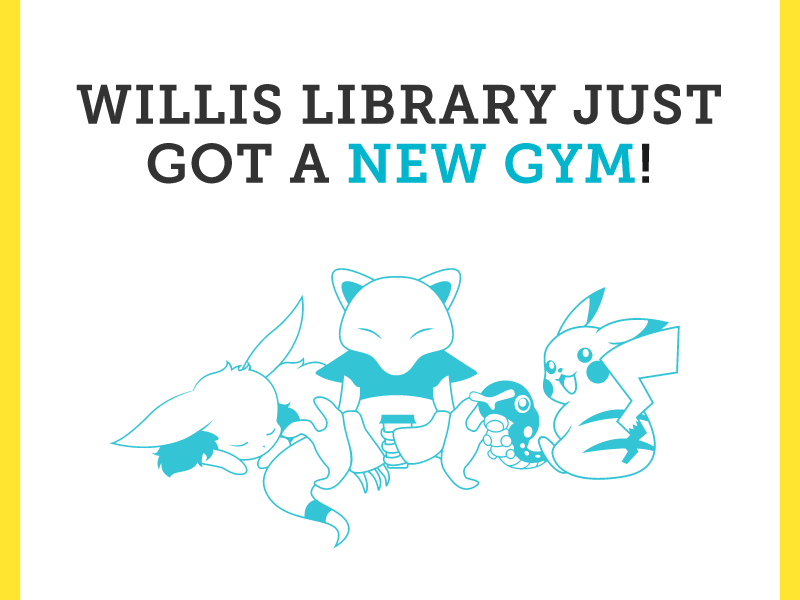
Pokemon Go
Pokemon Go has become the largest mobile game in history! You can stop by Willis Library to stock up on supplies at the Pokestop, set lures, and defend your team’s gym. Check out the Media Library’s Pokemon Fever blog post for a list of Pokemon games. Browse the Library catalog for all things Pokemon. Upload an .stl file to the Factory for a Pokemon 3D print for only $2.50 per hour to print. We’ll contact you with additional cost information and estimated delivery time. Dive into Japanese media! Check out our anime and manga/graphic novel items. Gym Badges Available: Willis Library Services Desk Media Library Service Desk Eagle Commons Library Service Desk This week many Pokemon trainers have gathered on shaded benches to challenge the reigning team of the Willis Library Pokemon Gym. At the helm of this part of the Library Mall is a well-loved statue, The Sustaining Arch. In 2004 the UNT Student Government Association commissioned UNT Alumnus Jonathan Snow to create the archway of cast-bronze books. It serves as a tribute to students, alumni, faculty, and staff our campus community has lost over the years. The significance of this location inspired the UNT Willis Library Spirit Badge. After battling at the Willis Library Pokemon Gym, stop by the Willis Library Services Desk, Media Library Service Desk, or Eagle Commons Library Service Desk to pick up a Spirit Badge to mark your progress on your Pokemon journey. Badges available while supplies last. Download the UNT Willis Library Spirit Badge. Who Controls the Library Gyms? in_the_news
Posted:
07/15/2016
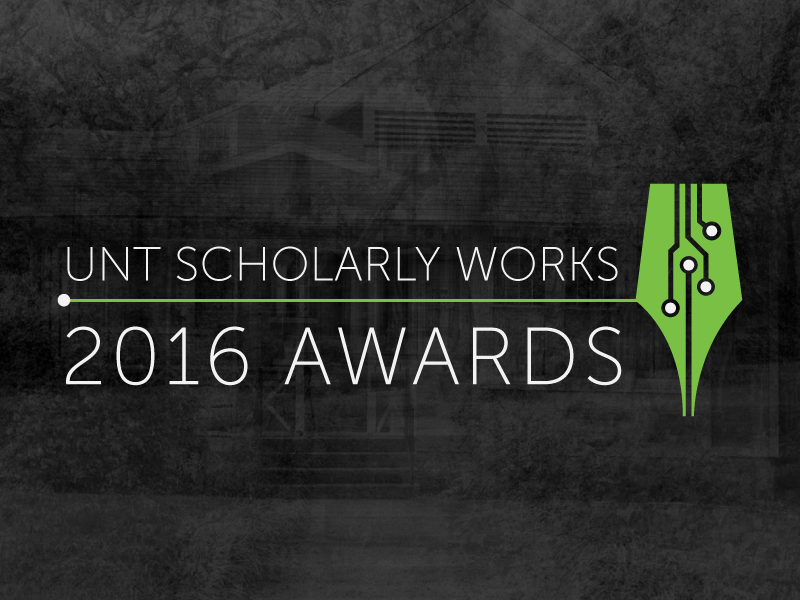
UNT Scholarly Works Outstanding Contributor Award 2016 Winners
Dr. Paul Marshall and Dr. Mark McKnight are 2016 winners of the Scholarly Works Outstanding Contributor Award. About the Award Sponsored by the UNT Libraries, the 2016 UNT Scholarly Works Outstanding Contributor Award recognizes contributors whose items included in the UNT Scholarly Works institutional repository were accessed the most frequently and/or had the highest number of downloads. This year, awards were made in two categories: UNT Libraries Employees and Other UNT Community Members. Previous winners were ineligible. 2016 Winners Dr. Paul Marshall Paul Marshall is Regents Professor of Chemistry at UNT. His research interests include: gas-phase kinetics of atoms and small molecules; atmospheric and combustion chemistry. Elementary reactions are studied over wide temperature ranges, and the results related to ab initio theoretical calculations. From April 1, 2015 to March 31, 2016, Dr. Marshall contributed 89 items which received a total of 592 uses during this period. You can view Dr. Marshall’s works within the UNT Scholarly Works Collection. Dr. Mark McKnight Mark McKnight is the Head of the UNT Music Library; he also teaches coursework in the UNT College of Music Division of Theory, History, and Ethnomusicology and in the UNT College of Information. His research interests include: 19th-century American music criticism, early American sheet music, music classification systems, music forms and genres, and the music of Louisiana and New Orleans. From April 1, 2015 to March 31, 2015, Dr. McKnight contributed 12 items which received a total of 118 uses during this period. You can view Dr. McKnight’s works within the UNT Scholarly Works Collection. digital_libraries_honors_and_awards
Posted:
07/14/2016
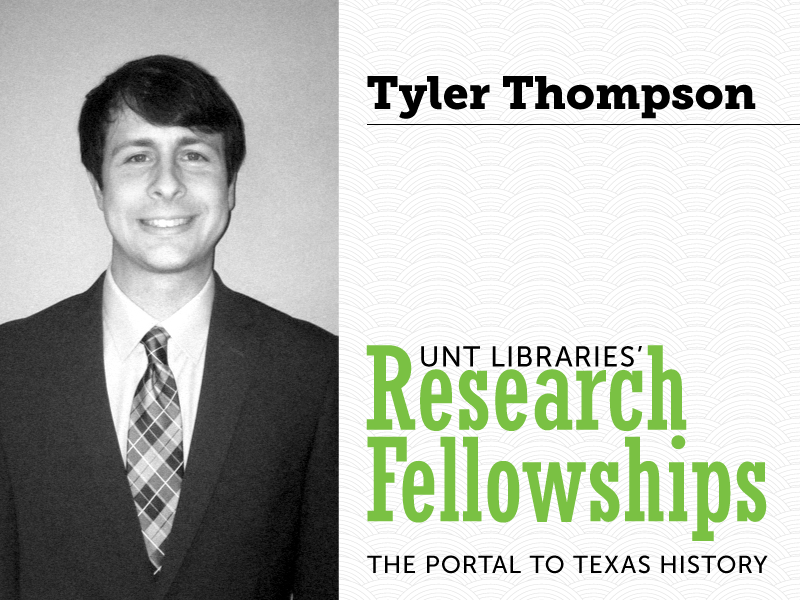
The Portal to Texas History 2016 Research Fellowship Awardee - Tyler Thompson
Tyler Thompson is a PhD candidate at Texas A&M University. His project *Representations of American Indians in Texas Memory and Mythology, 1875-1936 The University of North Texas Libraries invite applications for the 2016 The Portal to Texas History Research Fellowship. Research using the Portal is relevant to studies in a variety of disciplines including history, journalism, political science, geography, and American studies. We encourage applicants to think creatively about the opportunities that research with large digital library collections can enable. Preference will be given to applicants who demonstrate the greatest potential for publication and the best use of The Portal to Texas History. The Portal to Texas History 2016 Research Fellowship Awardee Tyler Thompson Project Title Representations of American Indians in Texas Memory and Mythology, 1875-1936 Project Description This project is a crucial part of my dissertation that focuses on how Anglo-Texans used historical events, collectively memorializing the past in ways that justified conquest. I plan to analyze the Portal’s holdings that shed light on the erection of the Battle of Adobe Walls monument. This campaign was led in part by Olive K. Dixon, raising an analysis of gender roles in the 1920s. Secondly, analyzing these primary sources strengthens my understanding of the change over time regarding Native American representations, specifically, public perception about Quanah Parker other Comanches. Biography Tyler Thompson is a PhD candidate at Texas A&M University. He received his bachelor’s and master’s in history from UT-San Antonio. His dissertation examines how racial and gendered rhetoric underscored conquest across Texas which was justified in subsequent myths and memories of the history of the state. He was born in Austin, Texas, and he wants to teach and research for a university when he graduates. digital_libraries_in_the_news_research_fellowships
Posted:
07/08/2016
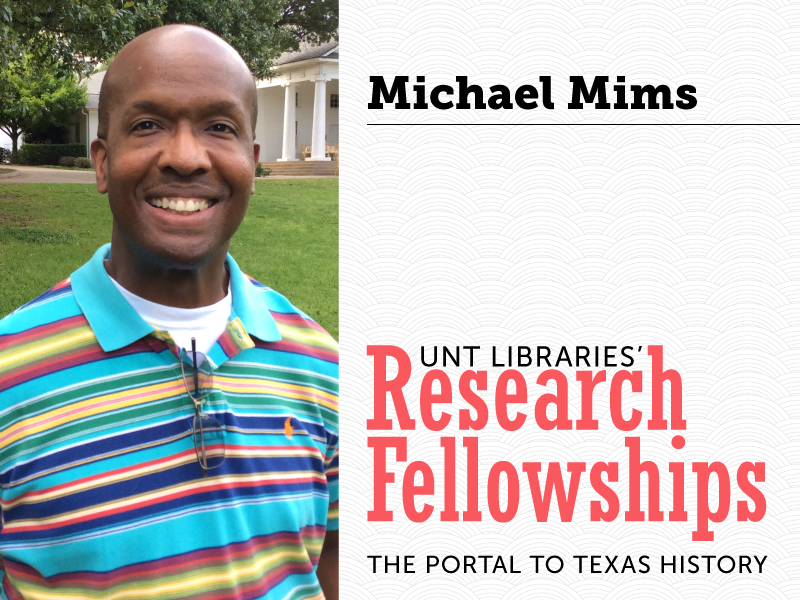
The Portal to Texas History 2016 Research Fellowship Awardee - Dennis Michael Mims
Dennis Michael Mims is a doctoral candidate at the University of Texas at Dallas. His project A Queer History of Dallas: The Formation, Development, and Integration of Big D’s LGBT Community, 1965-2005 shows how significantly things changed for lesbian, gay, bisexual, and transgender individuals living within the city of Dallas during these four decades. The University of North Texas Libraries invite applications for the 2016 The Portal to Texas History Research Fellowship. Research using the Portal is relevant to studies in a variety of disciplines including history, journalism, political science, geography, and American studies. We encourage applicants to think creatively about the opportunities that research with large digital library collections can enable. Preference will be given to applicants who demonstrate the greatest potential for publication and the best use of The Portal to Texas History. The Portal to Texas History 2016 Research Fellowship Awardee Dennis Michael Mims Project Title A Queer History of Dallas: The Formation, Development, and Integration of Big D’s LGBT Community, 1965-2005 Project Description Starting with the founding of the first gay organization in Dallas, the Circle of Friends, and concluding with the year that Lupe Valdez, the first openly-gay sheriff, took office in Dallas, the project will show how significantly things changed during these four decades for lesbian, gay, bisexual, and transgender individuals living within the city of Dallas. Biography Dennis Michael Mims is a doctoral candidate at the University of Texas at Dallas. He plans to pursue an academic career in which he researches, writes and teaches about civil rights and social movements. Mr. Mims has chosen this career path because he has always been fascinated by individuals who have organized to bring about social change and social justice for themselves and others. Mr. Mims is a native Texan. digital_libraries_in_the_news_research_fellowships
Posted:
06/30/2016
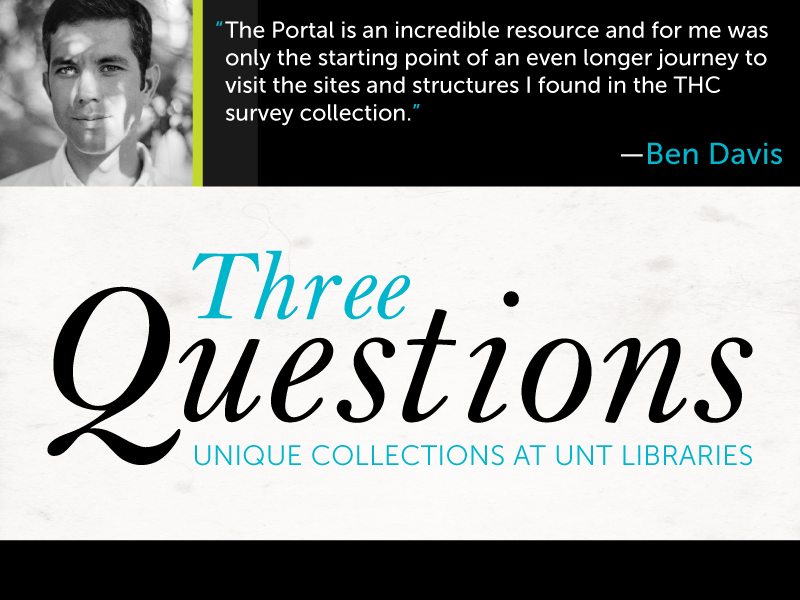
Three Questions with Ben Davis
Ben Davis’ work investigates the social experience of architecture by documenting the historic structures that have accommodated cultural rituals for over 150 years in Texas. Three Questions is an initiative to share the value that our faculty, students, and others in the UNT community derive from using the Unique Collections at UNT Libraries. How important are Unique Collections in your teaching, learning or research? The Portal provides the only material available on the web, in a centralized location, able to allow visual comparisons of historic architecture in Texas through the Texas Historical Commission’s Historic Resources Survey collection. I am excited for the potential of this collection as scholars and researchers begin to discern patterns in architectural trends across the state and contextualize these trends by comparing the photographs from the THC survey to other material in the Portal. There is not another resource in the state able to provide such a robust research experience. I look forward to becoming more familiar with other collections in the Portal as this remarkable resource continues to grow. How have Unique Collections changed the way you approach your research, teaching or learning? Using the Portal has made me aware of the various types of material that can augment architectural research, for instance keyword searches have revealed valuable information buried within documents I would not have otherwise thought to search. In developing the stories associated with some of Texas’ earliest structures I was able to learn more about the people for whom they were built and in some cases the people who built them through family papers and biographical essays. I was then able to compare these stories of the lives of the people who lived and worked in antebellum buildings with county level records to develop a more resolved idea of the uses and functions vernacular buildings in Texas were designed to perform. What do you want others to know about your research? The Portal is an incredible resource and for me was only the starting point of an even longer journey to visit the sites and structures I found in the THC survey collection. As I began to document the buildings contained within the survey, recorded in the 1970s, as way of illustrating age and change in Texas communities I was struck by the novelty of a collection looking back on itself and by the potential for filling in the gaps in the previous survey. In this way I realized that the Portal, and all collections, are organic and constantly growing. By making this material available to the public the potential for development and growth is limitless! On the left is an image from the THC collection and on the right is an image that I made. Ben Davis’ work investigates the social experience of architecture by documenting the historic structures that have accommodated cultural rituals for over 150 years in Texas. Davis uses traditional photographic methods as well as contemporary digital technology. His work is included in the Wittliff Collections at Texas State University. He was the recipient of the Priddy Scholarship at the University of North Texas in 2012, and the CVAD Student Project Award Fund in 2013. Davis’ work has been exhibited in venues across the United States including: Photo Center NW (WA), The Center for Fine Art Photography (CO), and in numerous solo shows in Texas. Davis is currently working in conjunction with the Gregg County Historical Association to document antebellum homes in East Texas for a book publication. Davis was born in Houston Texas in 1981. In 2007 he moved to Kerrville Texas to attend Schreiner University where he received a B.A. in Creative Arts. Davis currently lives in Denton Texas where he completed his MFA in Photography and is currently working toward an MS-LS (library science) in Archival Studies & Imaging Technology. Davis makes frequent excursions to East Texas to document the region’s remaining vernacular buildings and to maintain relationships with friends and family. external_relations_in_the_news_three_questions
Posted:
06/30/2016
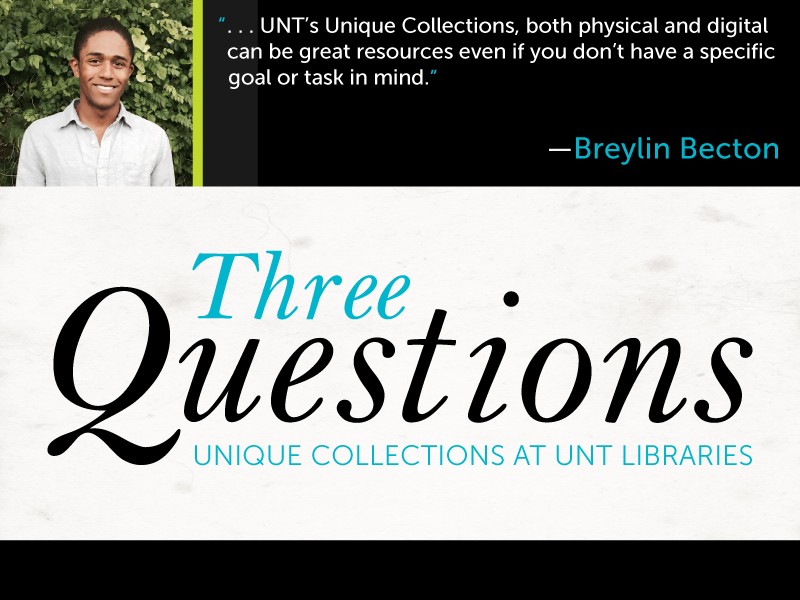
Three Questions with Breylin Becton
Breylin Becton is a recent graduate from UNT’s Mayborn School of Journalism. He graduated with a BA in Journalism with a focus in broadcast and a minor in political science. Three Questions is an initiative to share the value that our faculty, students, and others in the UNT community derive from using the Unique Collections at UNT Libraries. How important are Unique Collections in your teaching, learning or research? The unique collections hosted on UNT’s Digital Library were essential to my academic success in a variety of ways. I began working as a student assistant at Eagle Commons Library in the summer of 2014. My job has been to create and revise the metadata for Congressional Research Service Reports. So in that sense, the opportunity to work on the collection actually helped fund my education. However, as I began to grow more familiar with the collection I realized how useful the CRS reports could be in regards to research for school projects. From that point on, there were very few essays or articles I wrote in which I didn’t directly cite, or at least find other key sources by using the Digital Library and the CRS reports. How have Unique Collections changed the way you approach your research, teaching or learning? As someone who studies news media and political science you would think this would have been a no brainer for me, but having access to the CRS Reports really helped expand my understanding of just how many facets of our everyday life are directly affected by public policy. It also gave me a better understanding of the history of the political climate and public opinion surrounding important policy issues like social security, welfare, trade agreements, counterterrorism, and environmental protection. Now when tasked with a writing project, my brain often goes to policy first as a frame for understanding social issues, rather than the other way around. What do you want others to know about your research? This isn’t so much about me personally, but I want to let everyone know that UNT’s Unique Collections, both physical and digital can be great resources even if you don’t have a specific goal or task in mind. There have been several times where I found creative inspiration while just idly perusing all the interesting documents available in various collections. There’s something very entertaining about skimming through old maps, outdated UNT magazines, and other documents that shine a light on what life used to be like here in Denton and beyond. Breylin Becton is a recent graduate from UNT’s Mayborn School of Journalism. He graduated with a BA in Journalism with a focus in broadcast and a minor in political science. He is a self-avowed public radio/podcast nerd. external_relations_in_the_news_three_questions
Posted:
06/01/2016
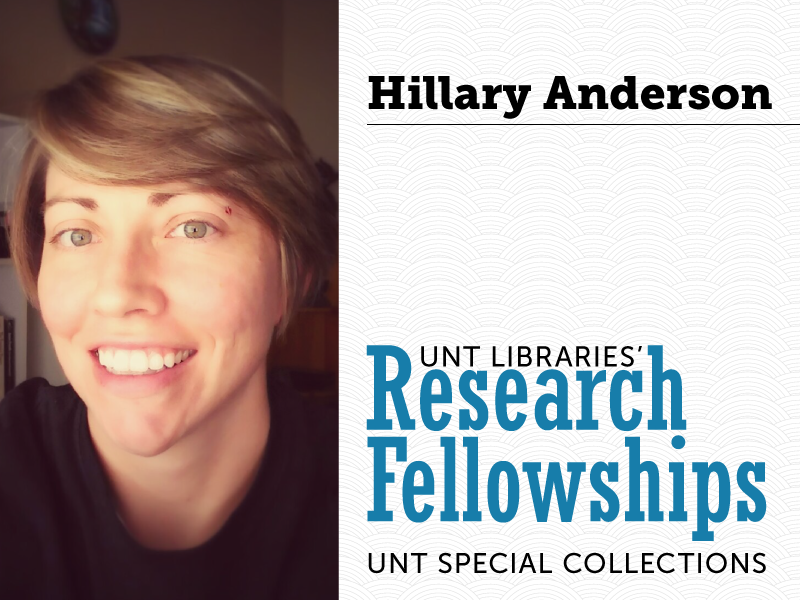
The UNT Special Collections 2016 Research Fellowship Awardee - Hillary Anderson
Hillary Anderson is a PhD candidate in History at Texas A&M University. Her project Radicalizing the South: Race, Gender, and Sexuality in 1970s Liberation Movements seeks to locate subaltern voices that add depth, richness, a fresh geography, and complexity to the historical narrative of civil rights in the 1970s. The University of North Texas Libraries invite applications for the 2016 UNT Special Collections Research Fellowship. Research in special collections is relevant to studies in a variety of disciplines including history, journalism, political science, geography, fine art, art history and American studies. We encourage applicants to think creatively about new uses for special collections. Preference will be given to applicants who demonstrate the greatest potential for publication and the best use of special collections at UNT Libraries. The UNT Special Collections 2016 Research Fellowship Awardee Hillary Anderson Project Title Radicalizing the South: Race, Gender, and Sexuality in 1970s Liberation Movements Project Description My doctoral research focuses on the intersections of race, gender, and sexuality in the United States (US) South during the 1970s in the Black Power movement, radical feminism, and gay liberation. This project seeks to locate subaltern voices that add depth, richness, a fresh geography, and complexity to the historical narrative of civil rights in the 1970s. Biography Hillary Anderson is a PhD candidate in History at Texas A&M University. She received her bachelor’s in Art and History and master’s degree in History from Texas A&M University-Commerce. Before returning for her PhD, she taught junior high and high school for several years, receiving recognition as Teacher of the Year in 2010. She has presented papers on various aspects of LGBT History at the Texas State Historical Association Meeting (2016), and the National Women’s Studies Association Conference (2015), among others. She looks forward to the research the UNT Libraries Fellowship will allow her to do. special_collections_in_the_news_honors_and_awards_research_fellowships
Posted:
05/09/2016
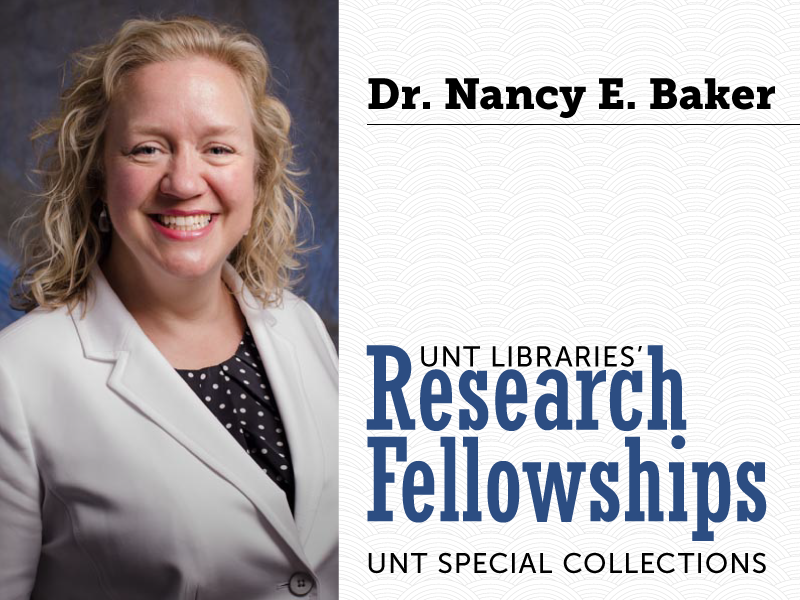
The UNT Special Collections 2016 Research Fellowship Awardee - Nancy E. Baker
Nancy E. Baker earned her Ph.D. in History from Harvard University. Her project Texas Feminist Legal Reformers in the 20th Century focuses on Texas feminist legal reformers who modernized the state’s laws, bringing Texas from worst in the nation for women to first in the nation to have a unified, reformed Family Code of law. The University of North Texas Libraries invite applications for the 2016 UNT Special Collections Research Fellowship. Research in special collections is relevant to studies in a variety of disciplines including history, journalism, political science, geography, fine art, art history and American studies. We encourage applicants to think creatively about new uses for special collections. Preference will be given to applicants who demonstrate the greatest potential for publication and the best use of special collections at UNT Libraries. The UNT Special Collections 2016 Research Fellowship Awardee Dr. Nancy E. Baker Project Title Texas Feminist Legal Reformers in the 20th Century Project Description My research focuses on Texas feminist legal reformers who modernized the state’s laws, bringing Texas from worst in the nation for women to first in the nation to have a unified, reformed Family Code of law. While at UNT, I will be conducting research in the papers of Sarah Hughes, a lawyer, state legislator, and federal judge who led the campaign that in 1954 secured women’s right to serve on juries. Hughes was an essential mentor to other Texas feminists, including Louise Raggio, who was responsible for the Marital Property Act of 1967, which paved the way for the Texas Equal Legal Rights Amendment. Biography Nancy E. Baker earned her Ph.D. in History from Harvard University. She is an Associate Professor of History at Sam Houston State University, where she has won awards for her teaching. She has published articles and chapters on the Equal Rights Amendment, conservative and right-wing women in 20th-century Texas, and Hermine Tobolowsky (“mother of the Texas ERA”). Currently, she is finishing revisions on a book on the Equal Rights Amendment and working on a book on Texas feminist legal reformers in the 20th century. special_collections_in_the_news_honors_and_awards_research_fellowships
Posted:
05/09/2016
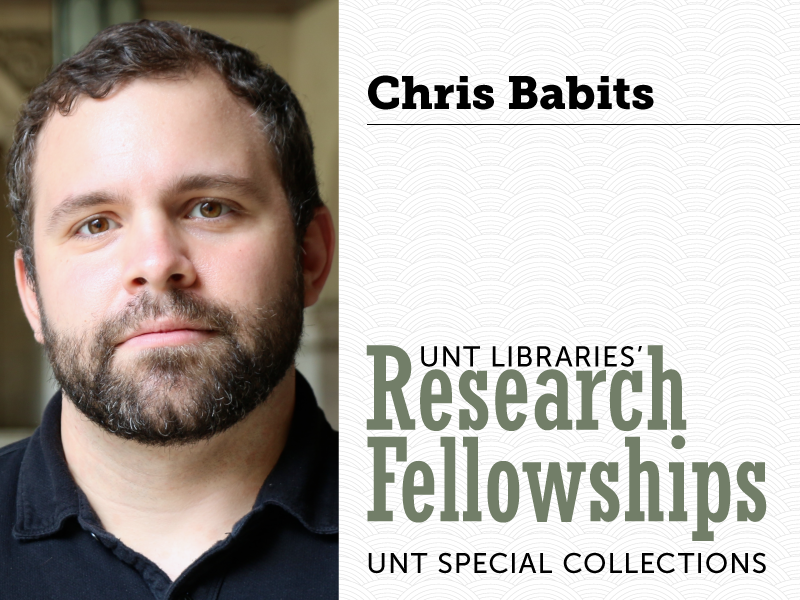
The UNT Special Collections 2016 Research Fellowship Awardee - Chris Babits
Chris Babits is a Ph.D. student in History at the University of Texas at Austin. His project To Cure a Sinful Nation: A Cultural and Intellectual History of Conversion Therapy in the United States from the Second World War to the Present Day is a history of the conversion therapy movement that helps us understand how religion and scientific inquiry intersect as well as the changing norms on gender and sexuality from the early Cold War into post-9/11 America. The University of North Texas Libraries invite applications for the 2016 UNT Special Collections Research Fellowship. Research in special collections is relevant to studies in a variety of disciplines including history, journalism, political science, geography, fine art, art history and American studies. We encourage applicants to think creatively about new uses for special collections. Preference will be given to applicants who demonstrate the greatest potential for publication and the best use of special collections at UNT Libraries. The UNT Special Collections 2016 Research Fellowship Awardee Chris Babits Project Title To Cure a Sinful Nation: A Cultural and Intellectual History of Conversion Therapy in the United States from the Second World War to the Present Day Project Description Conversion therapy, which aims to “cure” men and women of their homosexuality, was a common practice until the psychiatric establishment removed homosexuality from its list of mental disorders in 1973. As it grew more popular in the American South and Southwest, conversion therapy came under political fire for being religious moralizing in disguise. “To Cure a Sinful Nation” is a history of the conversion therapy movement that helps us understand how religion and scientific inquiry intersect as well as the changing norms on gender and sexuality from the early Cold War into post-9/11 America. Biography Chris Babits is a Ph.D. student in History at the University of Texas at Austin. His research examines the intersections of religion, psychiatry, and sexuality in twentieth-century America. He earned a Bachelor’s and Master’s in History from Clark University. Chris will spend 2016-2017 conducting dissertation research. In addition to the University of North Texas Special Collections Fellowship, he has been awarded a Columbia University Libraries Research Award, the Albert M. Greenfield Fellowship from the Historical Society of Pennsylvania, and a Southern Baptist Historical Library and Archives’ Lynn E. May Research Study Grant. special_collections_in_the_news_honors_and_awards_research_fellowships
Posted:
05/09/2016
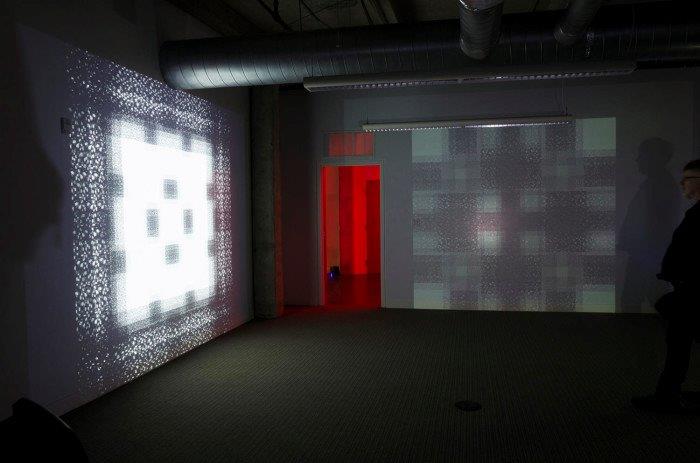
The Innovative ETD Award 2016 Winner
We are pleased to present the 2016 UNT Innovative ETD award to Jonathan C. Vogt. In his thesis exhibition entitled Static Bustle: Patterns Achieved through Repetitive Processes, he explores relationships between visual art and sound through experiments with new and traditional media, including sound, video, digital images, prints, and fibers. Jonathan C. Vogt, Master of Fine Arts (MFA) in Printmaking, College of Visual Arts and Design, Department of Studio (May 2015) Jon Vogt graduated from UNT in 2015 with a Masters of Fine Arts in Printmaking. In his thesis exhibition entitled [Static Bustle: Patterns Achieved through Repetitive Processes][Jonathan C. Vogt, Master of Fine Arts (MFA) in Printmaking, College of Visual Arts and Design, Department of Studio (May 2015)], Jonathan Vogt explores relationships between visual art and sound through experiments with new and traditional media, including sound, video, digital images, prints, and fibers. Through strategic processes of layering and repetition, Jonathan seamlessly unifies this remarkable range of media into an accessible and cohesive vision. Jonathan’s successful use of creative, innovated technologies to enhance the scholarly and popular impact of his thesis, as stated by his nominator and advisor, “surpasses that of all of the graduate students I have encountered in my thirteen-year tenure at CVAD and as professional artist in the discipline-at-large.” Jonathan’s innovative approach to digital and post-digital technologies began in CVAD’s Fab Lab, where he used a laser engraver to make patterned matrices for a series of hand-pulled prints called Band. He provided a demonstration at The Factory, UNT Libraries’ makerspace, in February 2015. He has since gone on to teach Printmaking at the University of Georgia where he is implementing an electronic equipment checkout area for students and faculty. Jon received a BFA from Iowa State University and a Professional Printer’s Certificate from the Tamarind Institute for Lithography. Jon continues to integrate electronic media into his artwork as he investigates the intersections of sound and visual art. Jon Vogt exhibits nationally and has been awarded numerous merits for his achievements. We are pleased to present the 2016 UNT Innovative ETD award to Jonathan C. Vogt. digital_curation_unit_honors_and_awards
Posted:
05/06/2016
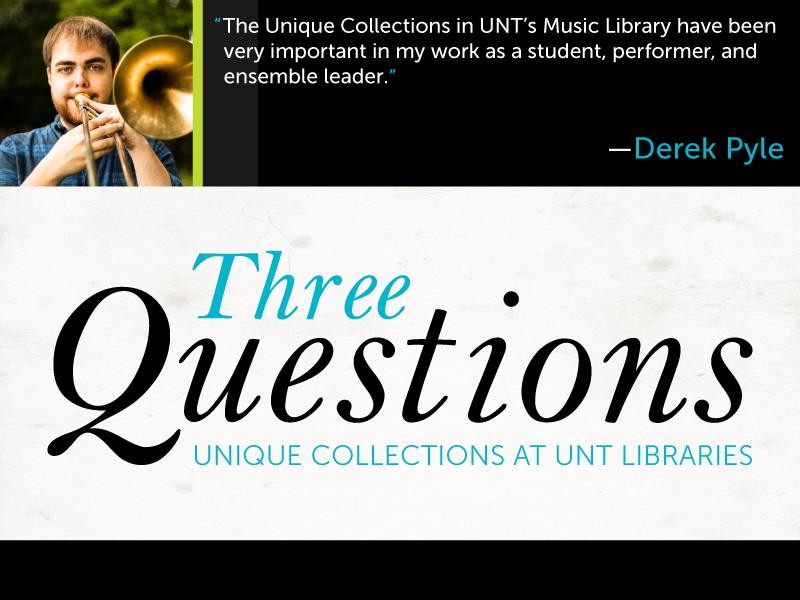
Three Questions with Derek Pyle
Derek Pyle is a senior jazz studies major at UNT, where he plays lead trombone in the Two O’Clock Lab Band and U-Tubes Jazz Trombone Ensemble. After graduating from UNT, Derek plans on pursuing a Masters Degree in Studio Music and Jazz Performance at the University of Miami in Coral Gables, Florida. Three Questions is an initiative to share the value that our faculty, students, and others in the UNT community derive from using the Unique Collections at UNT Libraries. How important are Unique Collections in your teaching, learning or research? The Unique Collections in UNT’s Music Library have been very important in my work as a student, performer, and ensemble leader. During the summer of 2015, I requested access to the Maynard Ferguson Collection, brought to UNT in 2008, for the purpose of once again performing the actual sheet music performed by Maynard Ferguson throughout his career. This led to the formation of the Maynard Ferguson Tribute Band in 2015, which was originally a group that performed in the jazz studies course Jazz Chamber Music. How have Unique Collections changed the way you approach your research, teaching or learning? Many parts of the MF Collection’s songs were lost, destroyed, or never finished over the course of Ferguson’s career. For example, Matt Wallace’s composition “Omaha” was memorized by each member of the band from a single, concert score written with a blue ink pen in 1987. In order for this song to be performed again, I had to re-notate the score to create individual parts for each member of the MF Tribute Band to read. What do you want others to know about your research? A world-famous jazz trumpeter and bandleader, Maynard Ferguson recorded nearly 70 studio albums as a bandleader from 1950-2006. His music library grew to over 700 compositions and arrangements, which were all placed into storage after Ferguson’s death in 2006. The Maynard Ferguson Tribute Band has performed everything from big band songs from the 1950’s to jazz-rock fusion songs from the 1980’s. Our ultimate goal as a group and tribute band is to pay as much respect to the composers and original recordings as we possibly can. We recently recorded an alternate arrangement of the song “Jack Usage” at the Panhandle House and Recording Studios in Denton that had not been previously recorded by Maynard Ferguson’s band. Derek Pyle is a senior jazz studies major at UNT, where he plays lead trombone in the Two O’Clock Lab Band and U-Tubes Jazz Trombone Ensemble. A freelance trombonist, composer, arranger, and educator, he has performed with notable artists such as John Clayton, Tito Puente, Jr., Tom “Bones” Malone, John Fedchock, Arturo Sandoval, Jon Faddis, Greg Gisbert, and Bernard Wright. After graduating from UNT, Derek plans on pursuing a Masters Degree in Studio Music and Jazz Performance at the University of Miami in Coral Gables, Florida. external_relations_in_the_news_three_questions
Posted:
05/03/2016
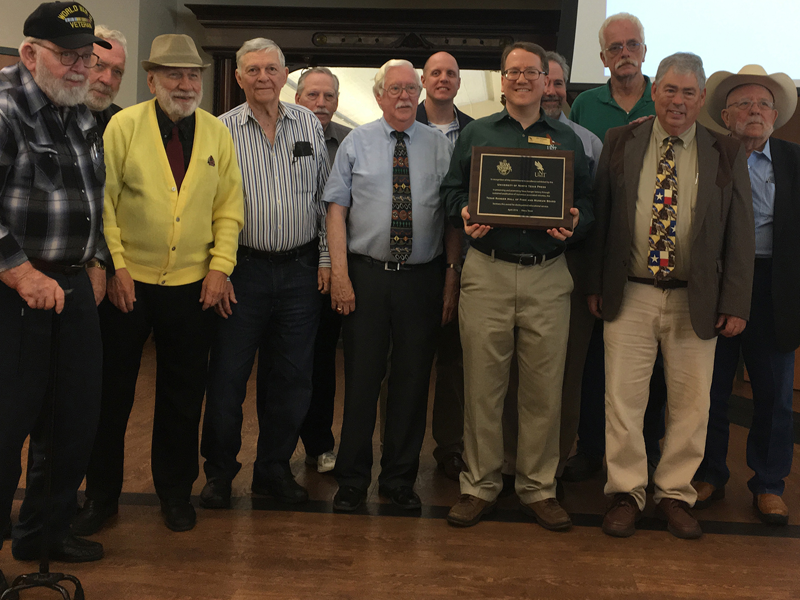
UNT Press Honored by Texas Ranger Hall of Fame and Museum Board
The UNT Press was honored April 30, 2016 with an award from the Texas Ranger Hall of Fame and Museum. The UNT Press was honored April 30, 2016 with an award from the Texas Ranger Hall of Fame and Museum. “I’m pleased that the Texas Ranger Hall of Fame and Museum has honored the University of North Texas Press for its commitment to publishing the finest Texas Ranger history,” said Ronald Chrisman, director of UNT Press. “It is a testament to our authors as well, honoring their dedicated research and writing to bring the story of the Texas Rangers to a wider audience through our publications.” To learn more, please see the InHouse news article UNT Press Honored by Texas Ranger Hall of Fame and Museum Board. Photo left to right: Robert DeArment, Chuck Parsons, Harold Weiss Jr., Bill Neal, Rick Miller, Donaly Brice, Nathan Jennings, Ron Chrisman, David Turk, David Johnson, Bill O’Neal, and Bob Alexander in_the_news_honors_and_awards
Posted:
05/03/2016
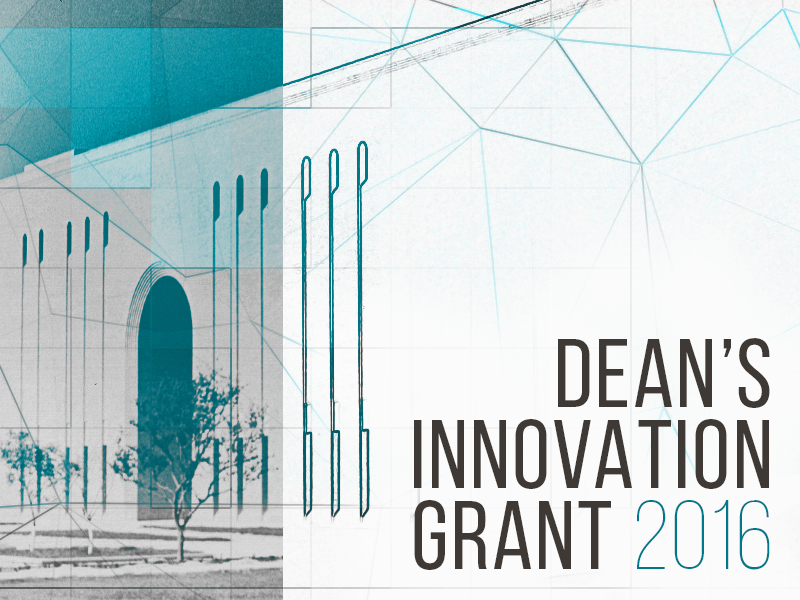
Dean's Innovation Grant 2016: Revving Up for Research
Revving Up for Research’s goal is to support Assistant Librarians from their initial appointment through their third year and help them build research skills and grow professionally. This is accomplished through group mentoring, where one mentor oversees several protégés and guides them in their professional development. The University of North Texas Libraries’ Dean’s Innovation Grant, formerly known as the Green Light To Greatness Award, provides funding to research and projects within the UNT Libraries that promote scholarship and contribute to the gathering of knowledge that helps improve our libraries, our university, and the community. Dean’s Innovation Grant 2016 Awardees Karen Harker, Catherine Sassen, Erin O’Toole, Beth Thomsett-Scott, Jesse Hamner Project Title Revving Up for Research: DIG Demonstration Proposal 2016 Project Description Revving Up for Research’s goal is to support Assistant Librarians from their initial appointment through their third year and help them build research skills and grow professionally. This is accomplished through group mentoring, where one mentor oversees several protégés and guides them in their professional development. Contributor Biographies Karen Harker is the Collection Assessment Librarian. She holds a Master of Public Health from University of Texas School of Public Health and a Master of Library Science from TWU. Catherine Sassen, Ph.D. is the Principal Cataloger in Cataloging and Metadata Services. She received both her Ph.D. and Master of Library Science from UNT Erin O’Toole is the Science Reference Librarian in Library Research Support Services. She holds a Master of Library Science from TWU and a Master of Public Health from University of Utah Medical School. Beth Thomsett-Scott is the Science and Engineering Librarian at UNT Libraries’ Discovery Park. She has a Master of Library and Information science from the University of Western Ontario and a Master of Science from the University of Manitoba. Jesse Hamner, Ph.D. is the Director of Research and Assessment for the University Libraries Dean’s Office. He has a Ph.D. in Political Science and a Master of Arts from Emory University, as well as a Master of Science in Geology from the University of Alabama. administrative_office_in_the_news_honors_and_awards
Posted:
05/01/2016
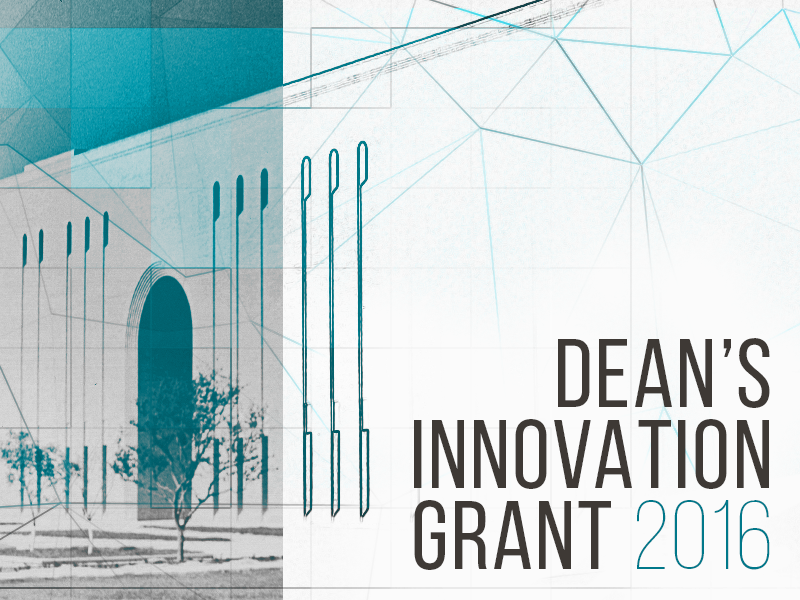
Dean's Innovation Grant 2016: Using technology to enhance discovery
The UNT Digital Library is home to thousands of resources, measuring upwards of 38,000 items. The goal of this project was to determine if access and use of these numerous digital library collections would increase by creating and making catalog records available for items within the library. The University of North Texas Libraries’ Dean’s Innovation Grant, formerly known as the Green Light To Greatness Award, provides funding to research and projects within the UNT Libraries that promote scholarship and contribute to the gathering of knowledge that helps improve our libraries, our university, and the community. Dean’s Innovation Grant 2016 Awardees Kevin Yanowski, Robbie Sittel, Betty Monterroso Project Title Using technology to enhance discovery, access, and use Project Description The UNT Digital Library is home to thousands of resources, measuring upwards of 38,000 items. The goal of this project was to determine if access and use of these numerous digital library collections would increase by creating and making catalog records available for items within the library. Contributor Biographies Kevin Yanowski is the Catalog Management Librarian in Cataloging and Metadata Services. He received his Master of Information Science and his Digital Content Management Certification from UNT. Roberta Sittel is the Department Head in the Government Information Connection. She received her Master of Information and Library Science from UNT. Betty Monterroso is the Government Information Specialist for the Government Information Connection. administrative_office_in_the_news_honors_and_awards
Posted:
05/01/2016
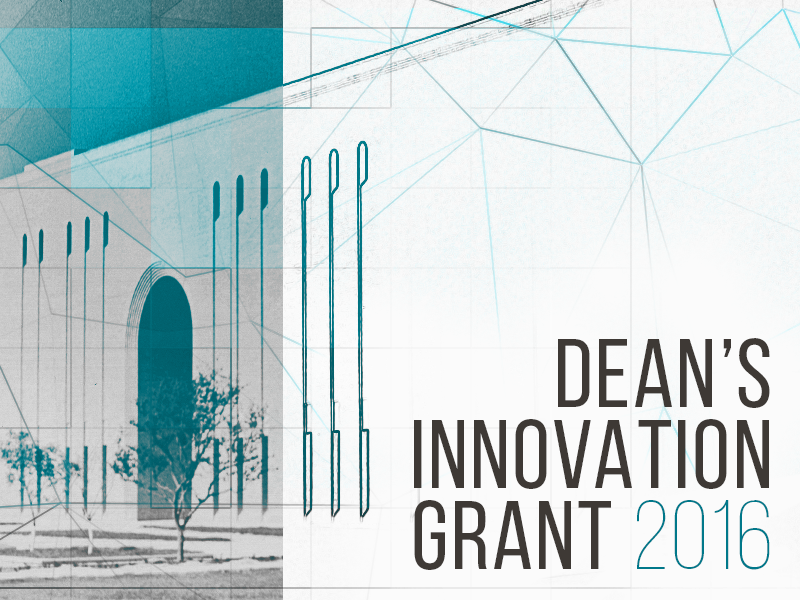
Dean's Innovation Grant 2016: The TX-Gender Project for Libraries – Phase II
The first phase of this project focused largely on research and examining the relationships between libraries and their transgender patrons. In this second phase of the TX-Gender Project for Libraries, researchers explored how to better serve UNT’s transgender population by conducting focus groups and equipping librarians with the tools to make library resources accessible to everyone. It is centered on understanding this relationship between the Texas transgender community and librarians, specifically perceptions and information-seeking behaviors. The University of North Texas Libraries’ Dean’s Innovation Grant, formerly known as the Green Light To Greatness Award, provides funding to research and projects within the UNT Libraries that promote scholarship and contribute to the gathering of knowledge that helps improve our libraries, our university, and the community. Dean’s Innovation Grant 2016 Awardees Julie Leuzinger, Jennifer Rowe, Spencer Keralis, Kathleen Hobson, K.R. Roberto Project Title The TX-Gender Project for Libraries – Phase II Project Description The first phase of this project focused largely on research and examining the relationships between libraries and their transgender patrons. In this second phase of the TX-Gender Project for Libraries, researchers explored how to better serve UNT’s transgender population by conducting focus groups and equipping librarians with the tools to make library resources accessible to everyone. It is centered on understanding this relationship between the Texas transgender community and librarians, specifically perceptions and information-seeking behaviors. Contributor Biographies Julie Leuzinger is the Department Head for the University Libraries Learning Services. She holds a master’s degree from Texas Woman’s University in Library Science. Jennifer Rowe is the Social Sciences and Community Engagement Librarian for the University Libraries Government Information Connection. She has a Master of Library Science from UNT. Spencer Keralis, Ph.D. is the Digital Humanities Coordinator for University Libraries Public Services. He has a Ph.D. in English and American Literature and a Master of Arts in English and American literature, both from New York University. Kathleen Hobson is the Director for the UNT Pride Alliance. She and Mr. Roberto both served as advisors and assisted in data analysis. K.R. Roberto works in the College of Information at the University of Illinois Urbana-Champaign. He and Ms. Hobson both served as advisors to this project and assisted in data analysis. administrative_office_in_the_news_honors_and_awards
Posted:
05/01/2016
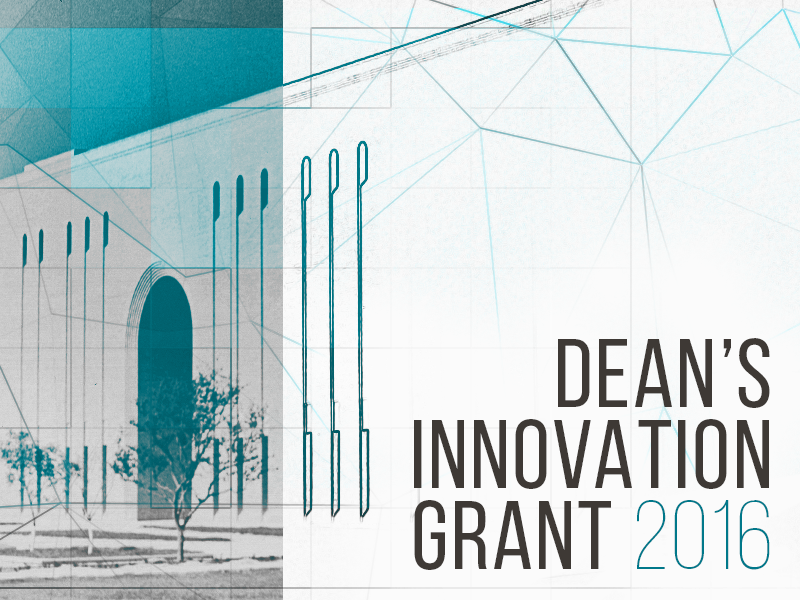
Dean's Innovation Grant 2016: How do I know if it's useful if I can't even get it to open?
As prevalent as e-books and online streaming video are in the world of technology and education, there has been little research concerning their usefulness in an academic setting.This project aims to fill in those gaps by looking deeper into this particular area of research. The researchers incorporated the underutilized method of usability testing to understand how people really respond to these specific types of technology. The University of North Texas Libraries’ Dean’s Innovation Grant, formerly known as the Green Light To Greatness Award, provides funding to research and projects within the UNT Libraries that promote scholarship and contribute to the gathering of knowledge that helps improve our libraries, our university, and the community. Dean’s Innovation Grant 2016 Awardees Erin Miller, Emily Billings, Susan Smith Project Title “How do I know if it’s useful if I can’t even get it to open?” : Assessing Information Interaction to Improve Library Collections and Services Project Description As prevalent as e-books and online streaming video are in the world of technology and education, there has been little research concerning their usefulness in an academic setting. This project aims to fill in those gaps by looking deeper into this particular area of research. The researchers incorporated the underutilized method of usability testing to understand how people really respond to these specific types of technology. Contributor Biographies Erin Miller is the Head of the Media Library. She received her Master of Library Science from the University of Kentucky. Emily Billings is the Electronic Resources Librarian for Collection Development. Susan Smith, Ph.D. is the Head of Library and Research Support Services. She has a Ph.D. in Public and Urban Administration from the University of Texas at Arlington and a Master of Library Science from the University of Oklahoma. administrative_office_in_the_news_honors_and_awards
Posted:
05/01/2016
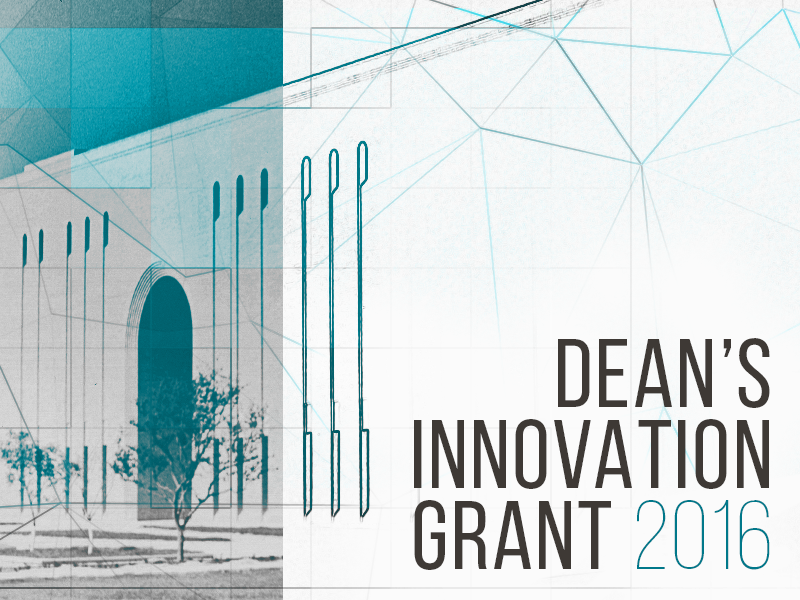
Dean's Innovation Grant 2016: Cost and Feasibility of FADGI Compliance
The Federal Agencies Digitization Guidelines Initiative (FADGI) released a set of guidelines in October of 2015 concerning the digital imaging of cultural heritage objects. This project’s goal was to investigate these guidelines, bring UNT’s Digital Projects Unit up to federal standards, and promote collaboration across the nation. The University of North Texas Libraries’ Dean’s Innovation Grant, formerly known as the Green Light To Greatness Award, provides funding to research and projects within the UNT Libraries that promote scholarship and contribute to the gathering of knowledge that helps improve our libraries, our university, and the community. Dean’s Innovation Grant 2016 Awardees Shannon Willis, Marcia McIntosh Project Title Cost and Feasibility of FADGI Compliance for the Digital Projects Unit Project Description The Federal Agencies Digitization Guidelines Initiative (FADGI) released a set of guidelines in October of 2015 concerning the digital imaging of cultural heritage objects. This project’s goal was to investigate these guidelines, bring UNT’s Digital Projects Unit up to federal standards, and promote collaboration across the nation. Contributor Biographies Shannon Willis is the Digital Projects Lab Manager for the University Libraries Digital Projects Lab. Marcia McIntosh is the Digital Production Librarian in the University Libraries Digital Projects Lab. She has a master’s degree in information studies from the University of Texas at Austin. administrative_office_in_the_news_honors_and_awards
Posted:
05/01/2016
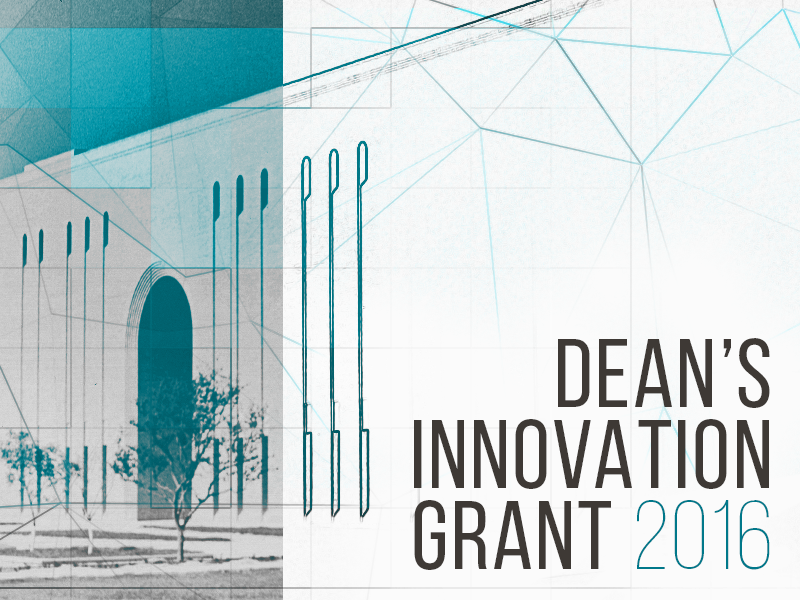
Dean's Innovation Grant 2016: Are print books REALLY dead?
Even in today’s technology-based world, people who are known as “digital natives” still prefer print books to e-books. E-books are perceived to be useful in an academic setting, but there are still gaps in this kind of research. This study aimed to understand and collect data on the usefulness of e-books and how students respond to them. The University of North Texas Libraries’ Dean’s Innovation Grant, formerly known as the Green Light To Greatness Award, provides funding to research and projects within the UNT Libraries that promote scholarship and contribute to the gathering of knowledge that helps improve our libraries, our university, and the community. Dean’s Innovation Grant 2016 Awardees Susan Smith, Erin Miller, Allyson Rodriguez Project Title Are print books REALLY dead?: Exploring the relationship between the technology acceptance model and the use of e-books at a large research university Project Description Even in today’s technology-based world, people who are known as “digital natives” still prefer print books to e-books. E-books are perceived to be useful in an academic setting, but there are still gaps in this kind of research. This study aimed to understand and collect data on the usefulness of e-books and how students respond to them. To do this, researchers provide incentives to encourage people to take surveys related to library usage and reading habits, specifically in the context of the Technology Acceptance Model, which found that faculty members who perceived e-books as easier to use were more likely to accept and use them Contributor Biographies Susan Smith, Ph.D. is the Head of Library and Research Support Services. She has a Ph.D. in Public and Urban Administration from the University of Texas at Arlington and a Master of Library Science from the University of Oklahoma in Library and Information Studies. Erin Miller is the Head of the Media Library. She received her Master of Library Science from the University of Kentucky. Allyson Rodriguez is the Strategic Collections Librarian for Collection Development. She received her Master of Library Science and her Graduate Academic Certificate in Advanced Management in Libraries and Information Agencies from UNT. administrative_office_in_the_news_honors_and_awards
Posted:
05/01/2016
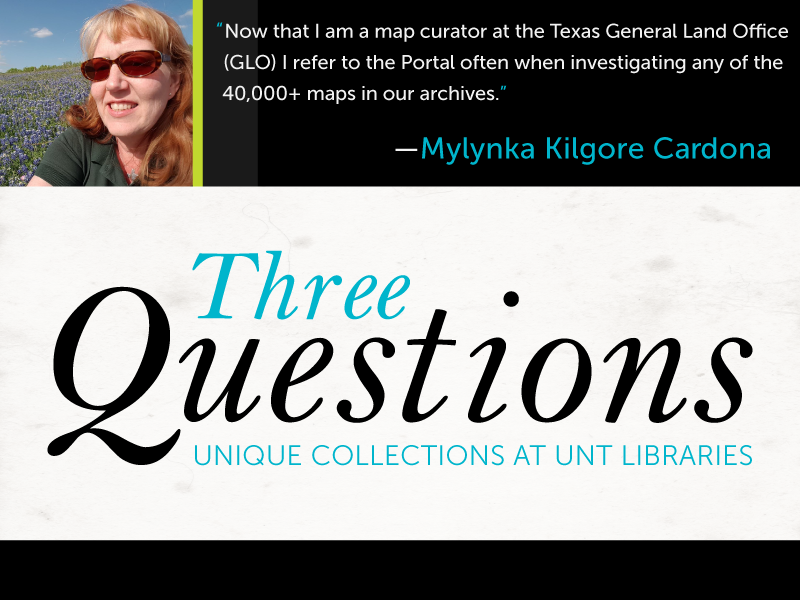
Three Questions with Mylynka Kilgore Cardona, Map Curator
Mylynka Kilgore Cardona holds a PhD in Transatlantic History from The University of Texas at Arlington. She has a background in historical cartography, Atlantic revolutions, and intercultural transfers. She is currently a map curator at the Texas General Land Office, Archives and Records Division in Austin. Three Questions is an initiative to share the value that our faculty, students, and others in the UNT community derive from using the Unique Collections at UNT Libraries. How important are Unique Collections in your teaching, learning or research? I first learned of the Portal while working on my PhD at UT-Arlington and several maps from our Special Collections were in the process of digitization at UNT. While an adjunct professor at UTA, I used the Portal to help round out my lecture notes and directed students to it as a valuable resource for their projects. Now that I am a map curator at the Texas General Land Office (GLO) I refer to the Portal often when investigating any of the 40,000+ maps in our archives. How have Unique Collections changed the way you approach your research, teaching or learning? The Portal has helped me to locate items I would not otherwise have had access to and has spawned new interests, giving me topics to pursue both personally and professionally. Having access to the scanned maps aids my work at the GLO - researching the items in our collection, gathering information for map collectors whose maps we have digitized, and helping me answer questions for our customers. The Portal is a source that I use so often I have it in the bookmarks bar on my home screen on my work computer! For my own research, access to newspapers from the nineteenth-century are the most helpful as I add material to my book manuscript. What do you want others to know about your research? Now that I am at the GLO my historical focus has shifted to include more Texas history. Thankfully my background in transatlantic history and historical cartography dovetails nicely with this. My ongoing study of nineteenth-century “lady travellers” can only broaden and deepen with the inclusion of Texas and the Portal will definitely help with that. I am currently working on converting my doctoral dissertation, “The Six Lives of Alexandrine Tinne,” to a book manuscript and doing additional research for that project. Mylynka Kilgore Cardona holds a PhD in Transatlantic History from The University of Texas at Arlington. She has a background in historical cartography, Atlantic revolutions, and intercultural transfers. Her 2015 dissertation “The Six Lives of Alexandrine Tinne” looked at the Dutchwoman’s explorations on the Nile River in the 1850s and 60s and the uses of her image/story/life after her 1869 death. Cardona has taught courses in both world and US history, nineteenth-century women travelers, and women’s and gender studies. She is currently a map curator at the Texas General Land Office, Archives and Records Division in Austin. external_relations_in_the_news_three_questions
Posted:
04/19/2016
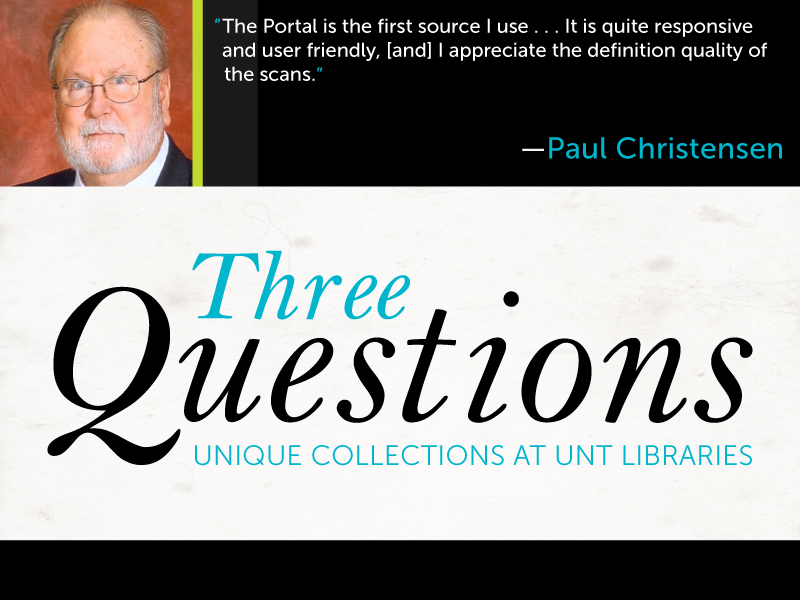
Three Questions with Paul Christensen
Paul Christensen and his wife Donna founded Omega Productions in March of 1973. The Company specializes in live concert television specials, as well as live concert CD recordings. Omega also provides live event production and consulting services to the Entertainment and Sports Industries. Three Questions is an initiative to share the value that our faculty, students, and others in the UNT community derive from using the Unique Collections at UNT Libraries. How important are Unique Collections in your teaching, learning or research? In 2010, my wife and I moved to Palacios and the Texas Gulf Coast. We purchased a commercial building built just after the town was founded, in 1909. After restoring the structure we wanted to explore the history, since all we had heard were rumors. About the same time, the local library had arranged with the UNT Digital Projects Unit to scan the past issues of the Palacios Beacon newspaper from 1911 to 1965. The issues would appear in the Portal to Texas History and be key word searchable. The past issues of the Beacon proved to be invaluable to our research. The information we discovered allowed us to locate the name of the original builder of the building. In addition, we were able to discover the names of various tenants as well as events related to the building. Our research eventually led to the State of Texas selecting the structure as a Registered Texas Historic Landmark (RTHL), a status which might not have been possible without access to the Portal to Texas History. How have Unique Collections changed the way you approach your research, teaching or learning? The Portal is the first source I use besides Google. It is quite responsive and user friendly. I appreciate the definition quality of the scans. I recently discovered a 32 page Historic and Progress Edition of the Palacios Beacon from October 19, 1939. I was able to download each page as a high resolution 1500x1969 graphic file. Because of the high scan quality we were able to re-create the special 1939 Historical Edition of the Beacon assembling an 11” x 17” tabloid pdf which was printed and bound. The commemorative edition was used as a gift to the Publisher of the Beacon for his Father’s support of the scanning project. What do you want others to know about your research? My wife and I are simple history and architecture enthusiasts. We are blessed to be living in such a great city as Palacios and to be living in a building with so much history. Paul Christensen and his wife Donna founded Omega Productions in March of 1973. The Company specializes in live concert television specials, as well as live concert CD recordings. Omega also provides live event production and consulting services to the Entertainment and Sports Industries. The Christensens co-produce all their projects working as a team… an approach they believe is responsible for the success of 48 years of marriage and 43+ years of award winning production excellence. The Christensens live south of Houston on the Texas Gulf Coast. During the company’s 43+ year history, Paul Christensen and his wife Donna and their staff have worked with over 300 of the best known personalities in the business: comedy stars such as Bob Hope, Steve Allen, Jack Lemmon and David Brenner; Broadway legends like Ben Vereen, Tommy Tune, Lena Horne and Chita Rivera; film artists Michael Keaton, Charlton Heston, Jimmy Stewart and Dennis Quaid and music legends like Ray Charles, Jerry Lee Lewis, Fats Domino, Carl Perkins and Johnny Cash. Their work has crossed all lines of music… from the jazz of Ramsey Lewis, Dizzy Gillespie, Michael Franks and Al Jarreau; the rock of U2, Van Halen, Little Feat and Neil Young; the country of Reba McEntire, Carrie Underwood, George Jones and Garth Brooks; the blues of B.B. King, Buddy Guy, Bobbie Blue Bland and Robert Cray; the R&B and funk sounds of The Neville Brothers, The Meters, The Commodores and Johnnie Taylor, to the gospel sounds of Kirk Franklin, Donnie McClurkin, Fred Hammond and the Mississippi Mass Choir. external_relations_in_the_news_three_questions
Posted:
04/11/2016
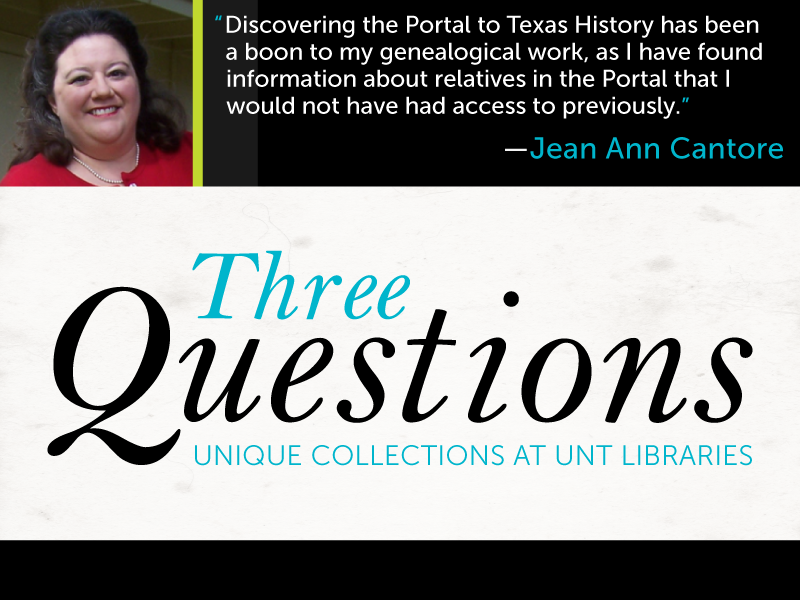
Three Questions with Jean Ann Cantore - Editor, Texas Techsan
Jean Ann Cantore is editor of Texas Techsan magazine at the Texas Tech Alumni Association. For the past 19 years, she has worked on the magazine, but prior to that position, she ran a writing center for engineering students and served as a development officer at Texas Tech. Three Questions is an initiative to share the value that our faculty, students, and others in the UNT community derive from using the Unique Collections at UNT Libraries. How important are Unique Collections in your teaching, learning or research? For the past 12-plus years, I have been researching my family history. All eight of the basic lines in my family tree converge in Texas. Discovering the Portal to Texas History has been a boon to my genealogical work, as I have found information about relatives in the Portal that I would not have had access to previously. How have Unique Collections changed the way you approach your research, teaching or learning? A number of my family members have lived in the Dallas/Fort Worth Metroplex, East Texas and Northeast Texas, dating back to the mid-to-late 1800s. Whether I am looking for information on an individual or a particular family in Texas, one of my first stops after establishing basic facts is the Portal. Every time I visit it, I learn something new and often make an unexpected discovery. What do you want others to know about your research? The extensive newspaper collection on the Portal to Texas History has been helpful for collecting factual information as well as providing insight into everyday life. Older newspapers, and particularly those in smaller communities, often have run more extensive articles about marriages, accomplishments and deaths than modern newspapers do. The slice-of-life that newspapers provide is wonderful. I look forward to learning more as more collections are added. Jean Ann Cantore is editor of Texas Techsan magazine at the Texas Tech Alumni Association. She holds a bachelor’s degree in English (technical writing) and Spanish and a master’s degree in English (comparative literature) from Texas Tech University. For the past 19 years, she has worked on the magazine, but prior to that position, she ran a writing center for engineering students and served as a development officer at Texas Tech. Her genealogical research has led her to discover ancestors who came to The Colonies from England in the early 1600s, settling in Jamestowne. She also has ancestors who helped settle Oklahoma Territory. Many of her relatives have served in the American Revolution, War of 1812, Civil War and wars in the 20th Century. external_relations_in_the_news_three_questions
Posted:
03/30/2016
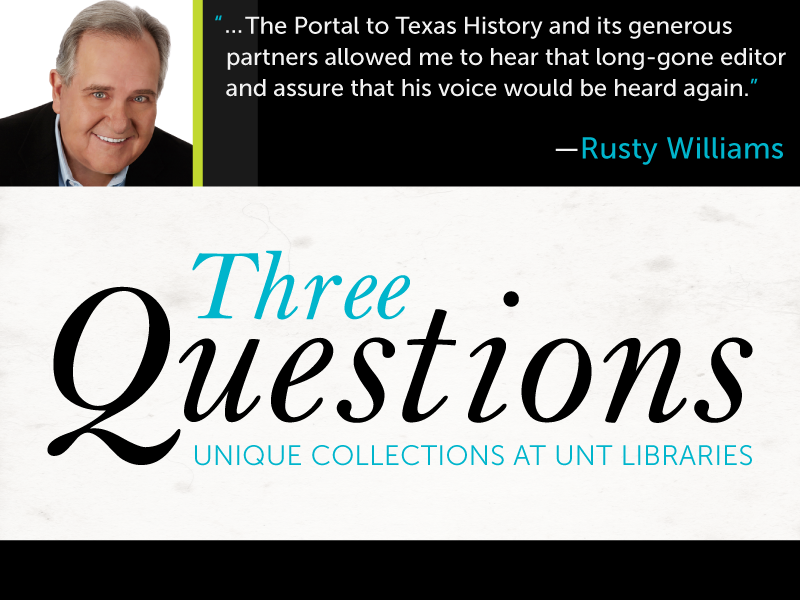
Three Questions with Rusty Williams, Writer-Historian
Texas A&M University Press will publish Rusty Williams’s The Red River Bridge War: A Texas Oklahoma Border Battle in June 2016. Rusty is also the author of My Old Confederate Home: A Respectable Place for Civil War Veterans (University Press of Kentucky) and Historic Photos of Dallas in the 1950s, 1960s, and 1970s (Turner Publishing). Three Questions is an initiative to share the value that our faculty, students, and others in the UNT community derive from using the Unique Collections at UNT Libraries. How important are Unique Collections in your teaching, learning or research? As a writer-historian, I find the Portal more valuable with every day as you add more newspapers, photos, magazines, books, and other historical materials. History is based on fact, and the more facts a researcher can wade through, the more illuminating and interesting history becomes. The primary source material shared by the Portal Partners and presented by The Portal to Texas History is essential to me when writing Texas’ history. How have Unique Collections changed the way you approach your research, teaching or learning? The Portal has helped me accelerate the pace of my book research while broadening the list of resources I can research efficiently. The Morris Memorial Library in Claude, Texas, is a beautiful facility, and the research librarians are eager to help. But it’s hard to justify an eleven-hour round trip from Dallas to Claude and back to study three weeks of 1931 newspaper coverage in the Claude News in their files. Now, though, with just a few keystrokes, I can study those old issues without leaving home, thanks to the Tocker Foundation and the Portal to Texas History. Easy access to those online resources allows me to write of history in a way that’s fuller and (I hope) more entertaining. What do you want others to know about your research? I tell of history through the stories of people who lived it, and I thrive on finding those “little” characters who witness great events and have a unique way of understanding them. Much newspaper coverage of the 1931 Texas-Oklahoma Red River bridge war—the subject of my upcoming book—saw the armed conflict as a regional comic opera. The editor of the Claude News, on the other hand, saw the bridge war as a class struggle, an armed conflict played out along the banks of the Red River. I likely never would’ve heard this editor’s voice if it had remained trapped on eighty-five-year-old newsprint. But the Portal to Texas History and its generous partners allowed me to hear that long-gone editor and assure that his voice would be heard again. [][] Texas A&M University Press will publish Rusty Williams’s The Red River Bridge War: A Texas Oklahoma Border Battle in June 2016. Rusty is also the author of My Old Confederate Home: A Respectable Place for Civil War Veterans (University Press of Kentucky) and Historic Photos of Dallas in the 1950s, 1960s, and 1970s (Turner Publishing). Rusty currently lives in Dallas and can be reached at rusty@rustywilliamsauthor.com. []: https://texashistory.unt.edu/ark:/67531/metapth348689/m1/2/?q=claude%20news%20july%2031,%201931 external_relations_in_the_news_three_questions
Posted:
03/21/2016
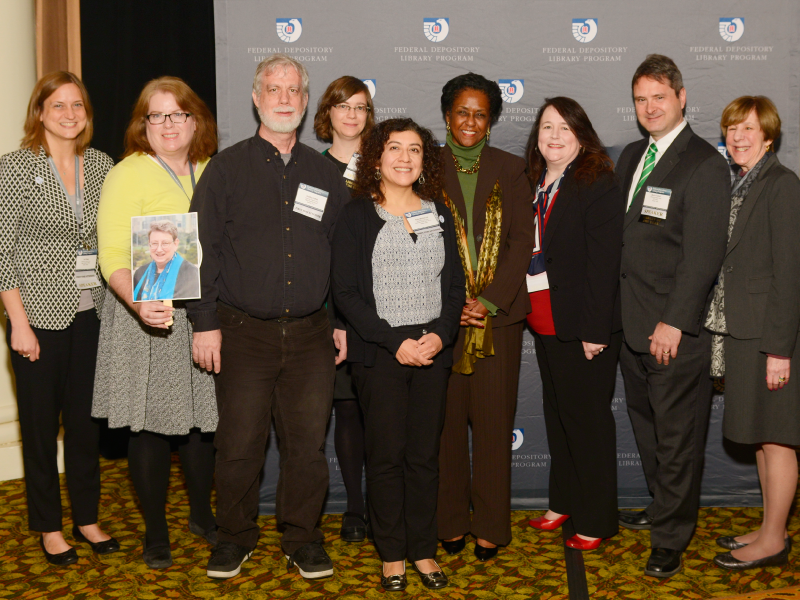
The U.S. Government Publishing Office (GPO) Honors UNT Libraries
The UNT Libraries is one of three libraries in the Federal Depository Library Program to be named 2015 Depository Library of the Year by the U.S. Government Publishing Office. The U.S. Government Publishing Office (GPO) has recognized the UNT library system as a 2015 Library of the Year for its leadership, innovation, and commitment to providing free public access to federal government information. For more than two decades, UNT has worked with the GPO to digitize and preserve government documents and online information, a project that launched before other libraries began their own efforts. As part of the Federal Depository Library Program in 1997, UNT and the GPO partnered to start the UNT Cyber Cemetery, a digital repository for preserving and providing access to defunct governmental agencies and commissions’ publications and websites. Since its launch, the Cyber Cemetery has brought the UNT libraries notable partnerships and accolades, and it’s a go-to resource for faculty and students. The UNT Digital Library, which is currently ranked 9th in North America, is home to the Cyber Cemetery. To learn more, please see UNT’s InHouse article, UNT libraries honored for leadership, innovation. honors_and_awards
Posted:
03/09/2016
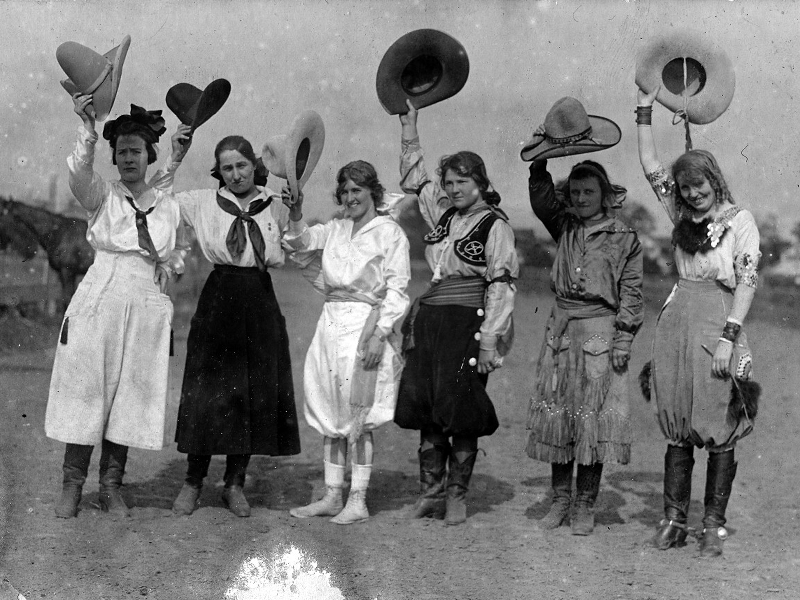
UNT Libraries Asks for Public's Help to Win $500,000 NEH Challenge Grant
The University of North Texas Libraries is asking for the public’s help to receive a $500,000 challenge grant from the National Endowment for the Humanities. The University of North Texas Libraries is asking for the public’s help to receive a $500,000 challenge grant from the National Endowment for the Humanities. Over the next five years, the university is tasked with raising $1.5 million – funds that would expand an endowment for the library’s most popular resource: The Portal to Texas History website. To donate, visit the NEH Challenge Grant website. The portal provides free public access and acts as digital storage space for millions of the state’s historical materials. The site makes it easy to access materials — from war photos and government documents to rare maps and old newspapers — that would otherwise be tucked away in libraries and museums, and thereby would only be accessible to teachers, schoolchildren, historians and community members who lived nearby or could travel to the libraries and museums. Each year, more than 6 million users from around the world tap into the site’s 7.5 million files, which include: More than 11,000 investigation records, photographs and hand-written journals related to the assassination of President John F. Kennedy. Documents are housed online in the John F. Kennedy Memorial Collection and Dallas Police Department Historical Records/Case Files. The landmark archive of the first television news program in Texas, as shown through photos, video and scripts from 1948 to 1980. The NBC 5/KXAS (WBAP) Television News Collection documents historical news events throughout North Texas and the development of broadcast news. The José L. Castillo Photograph Collection, the John J. Herrera Papers and the Texas Cultures Online Collection, which highlight the Latino community through art, political events, protests and other events. The Black Academy of Arts and Letters Collection, which features posters, programs, video recordings and photos that showcase Academy Award nominees, Grammy winners, jazz musicians and other entertainers. Maps, census records, news clippings and photographs that can assist amateurs and professionals with genealogy research. UNT News Service Article by: Monique Bird Featured news item image: From left to right, Fox Hastings, Bea Kirnan, Ruth Roach, unknown, Lorena Trickey (possibly), and Prairie Rose Henderson. The postcard comes from the Ruth Scantlin Roach Salmon Collection, which showcases the life of the world champion rodeo performer, and it is one of millions of documents available on UNT’s Portal to Texas History. Photo courtesy of UNT Special Collections. external_relations_grant_award
Posted:
03/01/2016
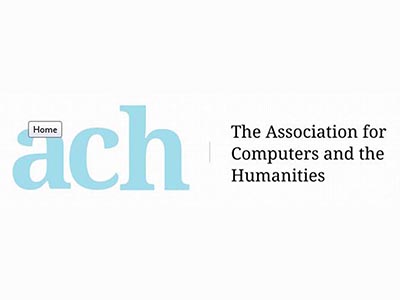
Digital Frontiers Receives ACH Sponsorship
We are delighted to announce that Digital Frontiers has received the endorsement and sponsorship of the Association for Computers and the Humanities (ACH). The sponsorship includes a financial award of $750 which will offset travel expenses for one keynote speaker. ACH is a major professional society for the digital humanities which supports and disseminates research and cultivates a vibrant professional community through conferences, publications, and outreach activities. ACH is based in the US, but boasts an international membership (as of May 2012, representing 21 countries worldwide). Digital Frontiers is the UNT Libraries’ annual conference and THATCamp with brings together the makers and users of digital resources for humanities research, teaching, and learning. The 5th annual conference will be held September 22-24, 2016 at Rice University, and is co-sponsored by the Fondren Library and the Humanities Research Center. public_services_in_the_news_honors_and_awards_grant_award
Posted:
01/13/2016

Mini-grants to support UNT faculty in bringing their out-of-print works back into circulation
UNT Libraries Scholarly Publishing Services is pleased to announce a competition for up to five mini-grants to support UNT faculty in bringing their out-of-print works back into circulation. Libraries staff will work with mini-grant recipients to determine whether publishing rights in the works have reverted to the faculty member and, if they have not, to assist the faculty member in seeking the return of those rights. Then the Libraries will digitize the work and make it free to read online and to download in e-book formats under the Eagle Editions imprint. Mini-grant applications will only fund the reissuing of works that: have at least one author or editor who is a current or emeritus faculty member at any UNT campus are works of scholarship on a topic relating to the humanities Applications must include: the title(s) of the work(s) nominated an abstract (no more than 1,000 words) of each work a short statement (no more than 1,000 words) explaining the value of making this work available for free online, in downloadable e-book formats, and, optionally, for sale in print Applications must be submitted by January 31, 2016 to Kevin.Hawkins@unt.edu for review by UNT Libraries staff. Decisions are expected by the end of February with publication of eligible works to take place in mid–2017. Please contact Kevin.Hawkins@unt.edu with any questions. These mini-grants have been made possible in part by the National Endowment for the Humanities: Exploring the human endeavor. administrative_office_honors_and_awards
Posted:
01/07/2016